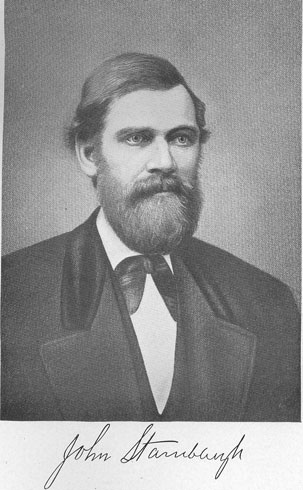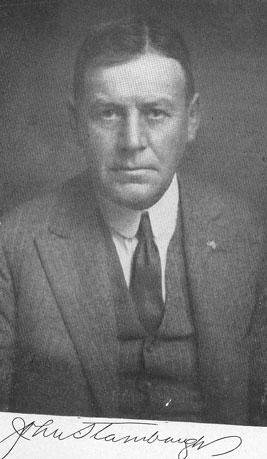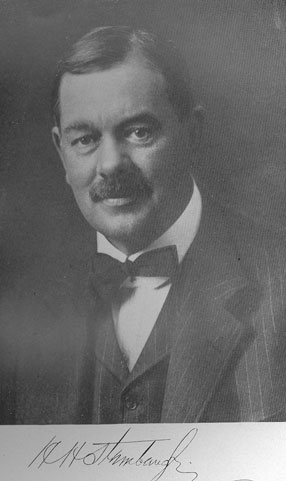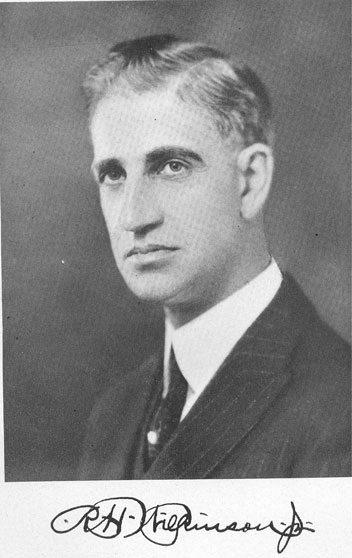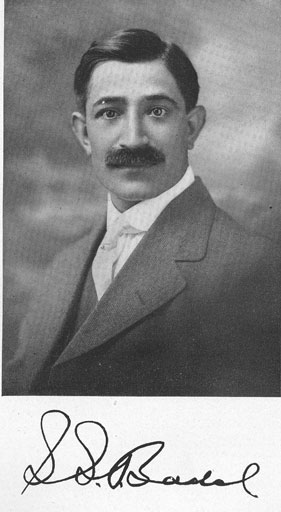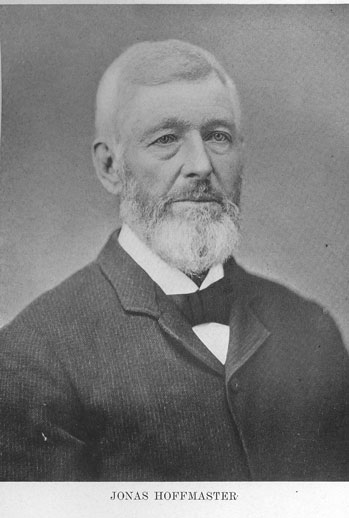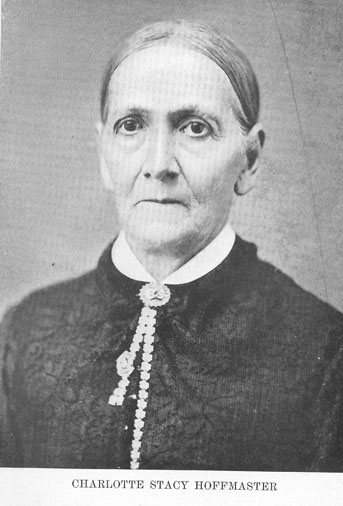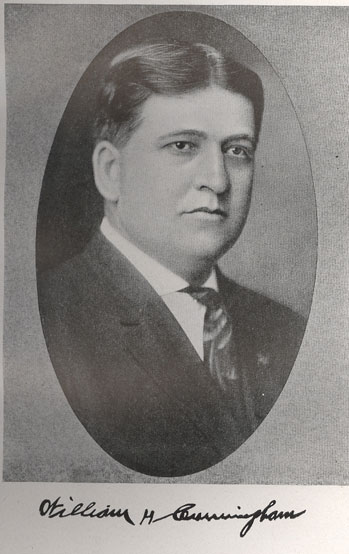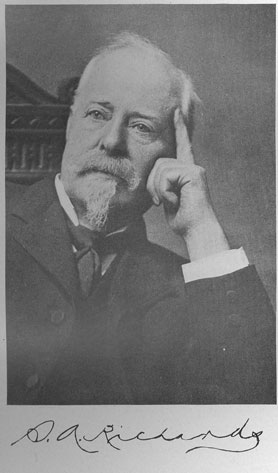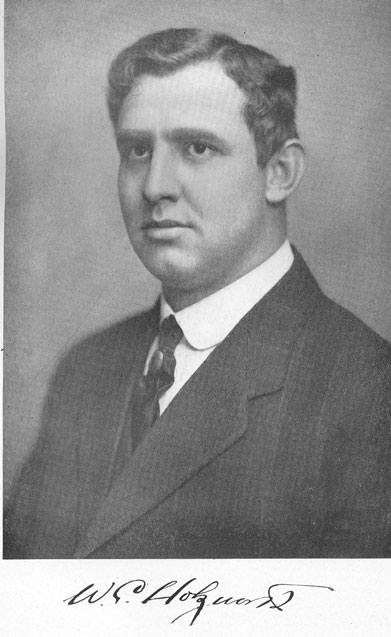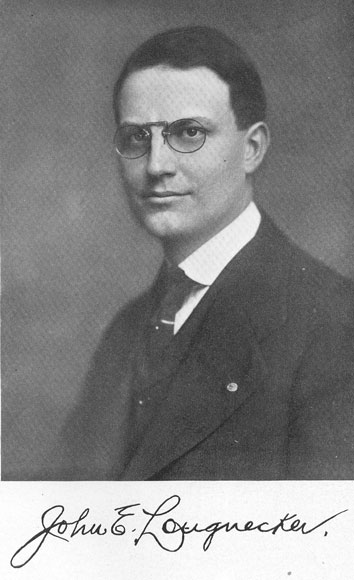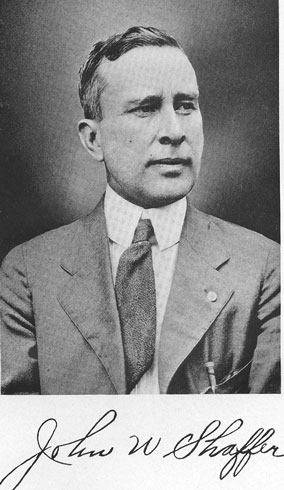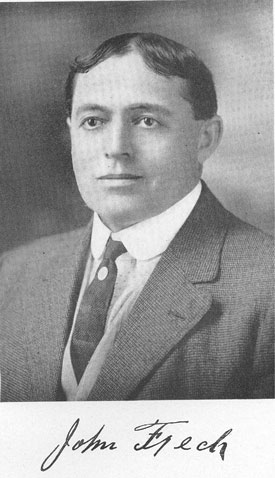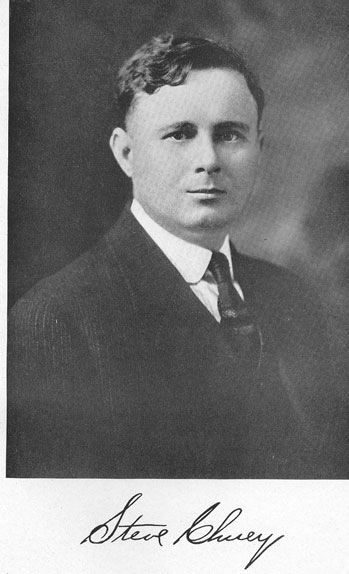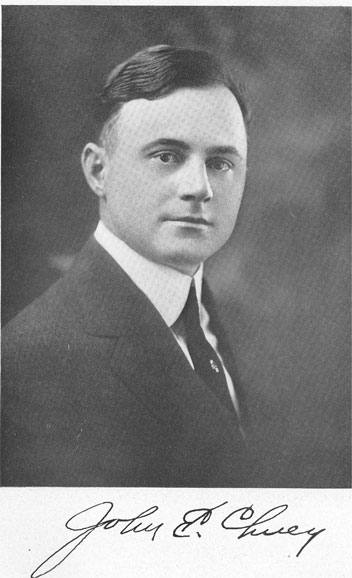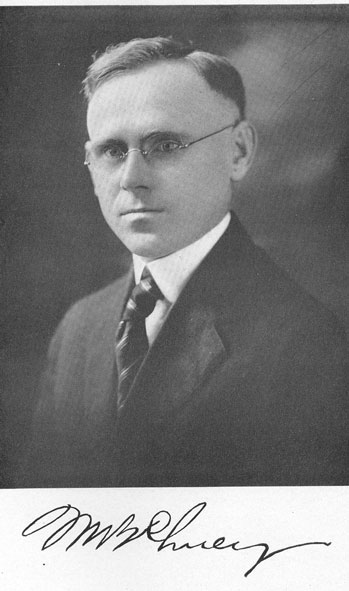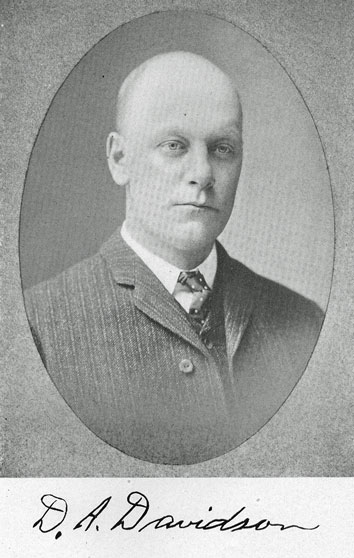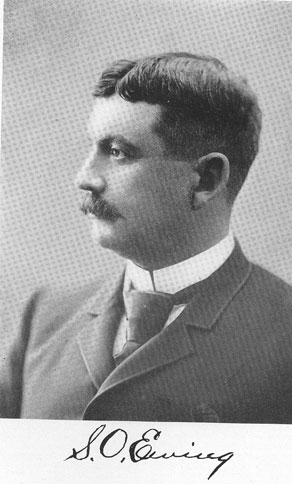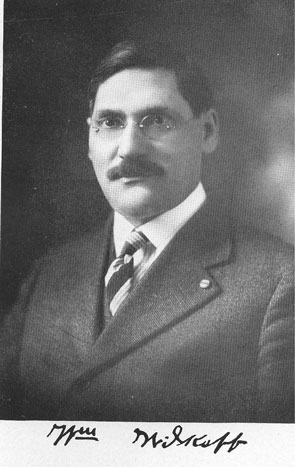Youngstown and the Mahoning Valley
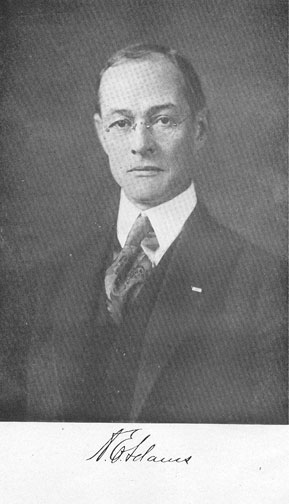
ASAEL E. ADAMS president of the first National and Dollar Barks Youngstown, director in many industrial concerns, and among the most active and influential figures in the business life of the Mahoning Valley, is descended from the pioneers of this country. He was born at Cleveland, Ohio, October 25, 1867, his father being Comfort A. Adams and his mother Catharine (Peticolos) Adams. The father was born in Connecticut of pure Yankee stock dating back to the first Colonial governor and a collateral relative of John Quincy Adams. The mother was of French Huguenot stock. They came to the Western Reserve early in life and resided' at Warren for a time, Comfort A. Adams having been during his residence there one of the early editors of the Western Reserve Chronicle. After the Civil war the family removed to Cleveland, where the father was engaged in manufacturing until his death.
Asael E. Adams supplemented studies in the common schools of Cleveland by a course in mechanical engineering at the Case School of Applied Science. His first active work was as a draftsman, and in 1893 he came to Youngstown in the capacity of secretary of the Mahoning Abstract Company. His work in that capacity led to his being elected secretary of the Dollar Savings & Trust Company when the latter was organized in 1895. In 1898 he was elected treasurer of that institution, serving as secretary at the same time. In 1902 he was chosen president of the Dollar Savings & Trust Company. Five years later Mr. Adams was elected president of the First National Bank, and he has filled the dual position of president of these two great institutions since that time.
Although disinclined to admit its possession, Asael E. Adams has demonstrated a degree of financial ability and foresight quite unusual. He is a deep student of economic and financial questions, and his advice is much sought upon such subjects. Few men are so well and widely informed along these lines, and few men are at the same time so thoroughly conversant with other domains of thought and action. As might be expected, Mr. Adams has been and is a leader in the industrial activity of his city, as well as in all movements looking toward its betterment from a physical, social or business point of view. He is a director in the Youngstown Sheet & Tube Company, the Youngstown Dry Goods Company, the Youngstown Steel Car Company, the Ohio Iron & Steel Company, the Youngstown Foundry & Machine Company the Electric Alloy Steel Company, the Federal Holding Company, and many other Youngstown concerns. He is a
member of the Ohio & Pennsylvania Canal Commission, one of the executive committee of the Ma- honing War Chest Council, and actively interested in almost every public movement in the City of Youngstown. He is a republican and attends the First Unitarian Church, is a member of the Youngstown Club, the Youngstown Country Club, and the Elks Club of Youngstown, also of the Union Club and the Mayfield Country Club of Cleveland.
Mr. Adams was married in 1896 to Anna Julia Shook, of Youngstown, and they have two children, Comfort Avery and Asael Edward, Jr.
MYRON I. ARMS. For practically three-quarters of a century the name of Arms has been prominently connected with many of the leading industrial, commercial and financial institutions of Youngstown and the Mahoning Valley. While it may be true that their lives have not attracted attention for their unusual brilliance or any picturesque or erratic qualities, yet they have been the kind out of which the warp and woof of the substance that goes to make up the continuous achievement of humanity is made. Each member of the family has acted well his part in life and, while primarily interested in his own affairs, he has not been unmindful of the general welfare, contributing to the upbuilding and improvement of the community in a very definite degree.
The progenitor of the Arms family in America, and from whom all of that name in this country have descended, was William Arms, a native of Great Britain, who came to America in young manhood. At Hadley, Massachusetts, he was married to Joanna Hawks, and later moved to Deerfield, Massachusetts, where several generations of his family lived. He was a stocking knitter by trade and was a man of prominence in that community, holding several local public offices. He fought the Indians at Great Falls where Gill, Massachusetts, now stands. He died in 1731 and his wife in 1739, and both lie buried at Deerfield. Among their children was William, who married Rebecca Nash. To them was born Daniel, who married Esther Smead, and they were the parents of Consider Arms, whose wife was Mercy Catlin. To these latter was born Israel Arms, who married Sarah Axtell, and to them were born five children, namely: Myron I., (I) married Emeline E. Warner; Jane M., the wife of Joseph B. Wilder; Freemon 0., married Emily Proscieus; Charles D., married Hannah M. Wick; Sophia B., the wife of Henry Manning. To Myron I. (I) and Emeline E. (Warner) Arms were born the following six children: Mary, the wife of Henry Wick; Warner, deceased, who married Fannie E. Wick;
2 - YOUNGSTOWN AND THE MAHONING VALLEY
Myron I. (II), who married Almira A. Hitchcock; Emeline E., the wife of Dr. George S. Peck ; Jane M., the wife of Charles F. Hofer; Harriet E., the wife of Charles H. Booth. To Warner and Fannie E. (Wick) Arms was born Myron I. Arms III.
Myron I. Arms (I) was born at Sodus, New York, in 1829, and was there educated. In 1846, at the age of seventeen years, he came to Youngstown, Ohio, and obtained employment as a clerk in the general store of Jonathan Warner, whose daughter, Emeline E., he eventually married. Some time afterward he embarked in mercantile pursuits on his own responsibility, in which he was successful. Subsequently he became a coal operator and also was interested in the Eagle Furnace at Brier Hill. He became widely known as a capable and successful business man, strictly upright in his relations with his fellow men, and a splendid neighbor. He died, universally honored and respected, in 1864.
Myron I. Arms (II) was born in Youngstown on January 30, 1854, and after attending the public chools and the Rayen School, was a student in Cornell College for one year. His business career had its beginning as a bank clerk, but later he engaged in the iron business in Niles, which he continued until the property was sold in two. Following in the footsteps of his father, he has confined his attention largely to commercial pursuits and is now prominently identified with the General Fireproofing Company, being chairman of the board of directors, president of the Ohio Leather Company, and is also a director of the First National Bank and the Dollar Savings and Trust Company. His accomplishments have been altogether worthy in all the lines in which he has directed his energies, his career having been one of close and fruitful identification with business interests of magnitude, in which he has gained marked prestige. Because of his success and of his sterling traits of character he has commanded uniform confidence and regard among his business associates and the respect of all who know him.
Mr. Arms was married to Almira A. Hitchcock, the daughter of William J. and Mary (Peebles) Hitchcock, and to them has been born a daughter, Almira, who is the wife of Paul Wick, of Youngstown.
WILFORD P. ARMS. The success of men in business or any vocation depends upon character as well as upon knowledge, it being a self-evident proposition that honesty is the best policy. Business demands confidence and where that is lacking business ends. In every community some men are known for their upright lives, strong common sense and moral worth rather than for their wealth or high political standing. Among such men in Youngstown is he whose name appears at the head of this paragraph, a man who has not only been progressive in his private affairs, successful in material pursuits, but a man of modest, unassuming demeanor, a fine type of the reliable, self-made American who always stands ready to unite with his fellows in every good work and active in the support of laudable public enterprises. In every respect he merits the high esteem in which he is held because of his public spirit, enterprise and splendid character.
The subject of this sketch is descended from old English stock whose advent on American soil was so far back in colonial history that the family is pretty thoroughly Americanized by this time. The first of the name in this country was William Arms, a native of England, who came to this country in young manhood, and who was married here in 1677 to Joanna Hawks. He first lived at Hadley, Massachusetts, where he followed his trade, that of a stocking knitter. Later he moved to Deerfield, Massachusetts, where most of his eight children were born. He served in the Indian fight at Great Falls, where now stands Gill, Massachusetts. He died in 1731 and is buried at Deerfield. Among his children was William Arms, who was noted as a Puritan and for his deep religious convictions. To his marriage with Rebecca Nash was born Daniel Arms, who married Esther Smead, Then follow Consider Arms, married Mary Catlin; Daniel Arms, married Luany Crosby; Lawson Arms, born in 1817, married Harriet A. Paddock; Wilford P. Arms, the immediate subject of this sketch. It is a matter of family pride that the various members of the Arms family through nearly two and a half centuries of history in America have been honest, industrious and law-abiding, with a deep reverence for Deity and for all religious matters. They have filled many local public offices with fidelity and have been found engaged in various vocations. Members of the family served in the various American wars, supporting the colonies in their struggle for independence, in the second war against Great Britain and thereafter they have been found stanchly loyal to the United States.
Wilford P. Arms was born in Jersey City, New Jersey, on December 14, 1861, being the eldest of three children born to his parents. In 1871, when he was about ten years of age, the family returned to their native village, Sodus, New York, where the subject attended the public schools and completed his studies at Sodus Academy. He remained on his father's farm until 1881, when he obtained employment with Powers, Brown & Company, a Youngstown corporation operating coal mines at Reynoldsville, Pennsylvania. A few years later he engaged in the quarrying of marble near Knoxville, Tennessee. In 1888 Mr. Arms came to Youngstown, where he has since resided with the exception of two years spent in Pittsburgh, Pennsylvania, at which time he became identified with the original organization of the Pittsburgh Coal Company. Since coming to the Mahoning Valley he has been identified with several of the largest corporations operating in this locality, among which have been the Brier Hill Iron and Coal Company, the Falcon Iron and Nail Company of Niles, Ohio, the Warren Rolling Mill Company of Warren Ohio, and the Trumbull Iron Company of Girard, Ohio. Since 1909 Mr. Arms' interests have been confined more closely to the City of Youngstown, and during the greater part of that time he has been identified with the Realty Trust Company, of which he is vice president. He also has other affiliations with large business enterprises here and is numbered among the leaders in business circles. During the
YOUNGSTOWN AND THE MAHONING VALLEY - 3
recent World war Mr. Arms held the federal appointment of fuel administrator for Mahoning County, a position entailing a vast amount of work and responsibility, and discharged his duties in a manner that earned for him the commendation of all who knew of his work in that relation.
In 1899 Mr. Arms was married to Olive F. Arms, a distant relative, the daughter of Charles Dayton Arms, granddaughter of Myron Israel Arms and great-granddaughter of Consider and Mary (Catlin) Arms. The record of testimony is ample that Mr. Arms is a good citizen in the full sense of the term, and he enjoys to a marked degree the respect and esteem of those who know him for his business ability, his interest in public affairs and his upright living.
FRED MONTGOMERY ORR. It is a well-attested maxim that the greatness of the state lies not in the machinery of the Government, or even in its institutions, but in the sterling qualities of its individual citizens, in their capacity for high and useful effort and unselfish endeavor and their devotion to the public good. To this class belongs Fred M. Orr, head and general manager of the undertaking establishment of John S. Orr & Son of Youngstown. A lifelong residence in this community has but served to strengthen his hold on the good opinions of those who have known him throughout his career. He has at all times been actuated by highest motives and lofty principles, and the history of Mahoning County should certainly contain his record, so intimately has he been connected with her history.
Fred Montgomery Orr was born in Youngstown in 1874 and is the son of John S. and Sarah (Montgomery) Orr. The father died on July so, 1911, and is survrved by his widow, who still resides in Youngstown, She is a daughter of Joseph and Nancy Montgomery and a sister of Randall Montgomery. John S. Orr became a member of the firm of Gillman, Orr & Company, who opened a furniture and undertaking establishment in 1870. Later the firm style was changed to Shields, Orr & Company, but some years afterward Mr. Orr withdrew from the firm and engaged in business on his own account, giving his attention to undertaking exclusively. His first place of business was where the Woolworth store is now located, whence he moved to the Davis Block. In 1885 he moved to the present location of the business and erected the building now used as the office of John S. Orr & Son. The business steadily increased, until it became necessary to build additions, which now extend to Boardman Street.
John S. Orr was born on January 15, 1842, and in young manhood learned the trade of a carpenter. During the Civil war he enlisted in the One Hundred and Forty-Second Regiment, Pennsylvania Volunteer Infantry, with which he served valiantly for three years, or until he was disabled by having an ankle fractured. From that time until the close of the war he served in the quartermaster's department. He lived at New Brighton, Pennsylvania, until 1858, or 1859, when he came to Youngstown. In 1869 doctors advised him that he had tuberculosis and should move to a more desirable climate, in consequence of which he spent one year at Garnet, Kansas. The physician's diagnosis proved to be wrong, however, and he returned to Youngstown, where he spent the remainder of his days in the enjoyment of good health. On February 16, 1863, while at home on a furlough from the army, he was married at New Castle, Pennsylvania, to Sarah Montgomery, who was born on July 17, 1842. Mr. Orr was a member of the Presbyterian Church, and his wife, of the Episcopal. After their marriage they joined the First Presbyterian Church of Youngstown, with which they ever afterward affiliated. Mr. Orr was a member of the Masonic Order, in which he had taken the Knight Templar degree of the York Rite, being a past commander of St. John's Commandery, and of the thirty-second degree of the Scottish Rite; he also belonged to the Ancient Arabic Order Nobles of the Mystic Shrine and the Independent Order of Odd Fellows. He was deeply interested in local public affairs and served efficiently as a member of the city council. He possessed great executive ability and was a natural leader of men. To him and his wife were born four children, namely : Edith, the wife of C. H. Kennedy, president of the Commercial National Bank, Youngstown ; Bessie, who lives with her mother ; Nellie A., the widow of Dr. J. B. Orwig, of Toledo, Ohio; and Fred M., the two last named being twins.
Fred Montgomery Orr was born March 6, 1874, and secured his elementary education in the public schools of Youngstown. He then attended and graduated from the Peekskill Military Academy at Peekskill on the Hudson River, near West Point, in June, 1892. Since that time he has been closely connected with the business founded by his father, and which has been known as John S. Orr & Son since 1900. He is a graduate of the Champion School of Embalming at Springfield, Ohio, and Clark's School of Embalming at Cincinnati, and is well qualified for the work to which he is devoting himself.
On October 7, 1902, Mr. Orr was married to Harriet Sims, a daughter of John D. Sims and a graduate of the Training School for Nurses of the Pennsylvania Hospital. To them has been born a daughter, Letitia Jane. Mrs. Orr was an enthusiastic worker in war activities and served as chairman of the local Red Cross from December, 1916, to November, 1918, embracing the duration of the war, her record being Too per cent.
Politically Fred M. Orr is an earnest supporter of the republican party and is deeply interested in civic affairs. Fraternally he is a member of the Free and Accepted Masons, being a past commander of St. John's Commandery, Knights Templar, and also belongs to the Ancient Arabic Order Nobles of the Mystic Shrine, the Independent Order of Odd Fellows, the Benevolent and Protective Order of Elks and the Protective Home Circle. Socially he is a member of the Youngstown Club, the Youngstown Country Club and the Chamber of Commerce, while religiously he and his wife are members of the First Presbyterian Church. Genial and obliging in manner, Mr. Orr has won a host of warm friends and is highly esteemed throughout the community.
PETER J. BURKE. Beginning life for himself at the foot of the ladder of attainments, Peter J. Burke has steadily forged his way upward and onward, and is now superintendent for the Metropolitan Life Insurance Company of the Youngstown District, which
4 - YOUNGSTOWN AND THE MAHONING VALLEY
comprises both Mahoning and Trumbull counties. A son of James Burke, he was born August 13, 1867, in Pittston, Pennsylvania, coming of Irish ancestry on both sides of the house.
Born in County Sligo, Ireland, James Burke was brought to the United States by his parents when a child, and has since made his home in Pittston, Pennsylvania, being now a venerable man of four score years. He served as a soldier during the Civil war, and was afterward in the grocery business, and also an agent for the Metropolitan Life Insurance Company. He married Annie Gallagher, who was born in County Mayo, Ireland, and as a young girl came with her parents to America, settling in Pittston, Pennsylvania, where she still resides, a bright and active woman of seventy-six years. Eight children blessed their union, seven of whom are now living, Peter J. being the first born child.
When a lad of but ten summers Peter J. Burke was picking slate out of the coal at the Pittston mines, and subsequently worked around the mines in minor capacities for a number of years. Ambitious to advance his education, he attended Woods' Business College in Scranton, Pennsylvania, in 1889 and 189o, paying his expenses with money earned by the hardest kind of work. He was subsequently engaged in the grocery business at Pittston for two years, and on giving that up became associated with the Metropolitan Life Insurance Company as an agent. In that capacity, Mr. Burke has been variously located, first in Jackson, Michigan, then in Findlay, Ohio, and later in East Liverpool, Ohio, from there coming in 1903 to Youngstown, where he has since remained, performing the duties devolving upon him as superintendent of the district in a highly satisfactory manner to all concerned.
Mr. Burke married, December 3o, 1891, Mary Cooney, who was born in Mahanoy City, Pennsylvania, a daughter of Patrick Cooney. Mr. and Mrs. Burke have five children living, namely: James, now with the Ohio City Gas Company in Columbus, serving during the World war for twenty months in the Signal Corps, and though he fought in two major engagements and one minor engagement and was under shell fire much of the time, returned from over seas a top sergeant; Mary, living at home; Paul, who was a student officer in the training camp at Notre Dame, Indiana, is now attending the Ohio State University; Joseph, attending the Rayen High School; and Ethel, attending the Ursuline Academy.
Mr. and Mrs. Burke and their family are members of St. Edwards Catholic Church, and for a long time Mr. Burke has been an active member of the Council of St. Edwards Parish. For three successive years he was grand knight of the Youngstown Council, Knights of Columbus. Recently Mr. Burke purchased a beautiful home on Bryson Street, adjoining the Wick estate, and there he and his family are enjoying all the advantages of both city and country life.
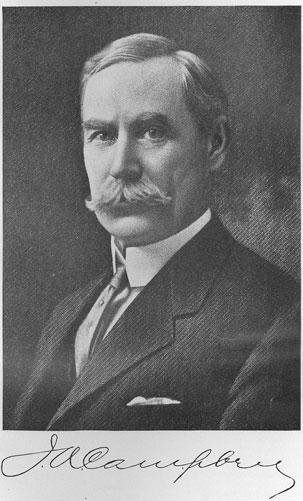
J. A. CAMPBELL. was born at Ohltown, Trumbull County, September 11, 1854. His father was a native of the United States and a farmer by occupation. The son attended the public schools, later entering Hiram College. While a student at that institution he received the appointment and passed the examination for entrance to West Point Military Academy. Circumstances prevented his adoption of a military career, however, and he soon afterward became a clerk in a coal office at Youngstown. With a brief experience in that line he engaged in the hardware business with a local concern and followed this occupation for five years. He then organized the Youngstown Ice Company and conducted it until 1890, when he entered the iron and steel business as general superintendent of the Trumbull Iron Company at Warren. Some time later this company was consolidated with the Union Iron & Steel Company, and that company placed Mr. Campbell in charge of its plant at Pomeroy, Ohio. This position he resigned in 1897 to become general superintendent of the Mahoning Valley Iron Company at Youngstown, and when the latter was purchased by the Republic Iron & Steel Company, became district manager for the Youngstown district.
In 1901 Mr. Campbell resigned his position with the Republic Iron & Steel Company to organize a corporation for the manufacture of sheets and pipe under the name of the Youngstown Iron, Sheet & Tube Company. He held the position of vice president and general manager in this corporation until July 26, 1904, at which time it had become an important concern, the capital having been increased from $600,000 to $4,000,000. He was then elected president of the company, a position he has since held and in which he has seen the company become one of the great industrial concerns of the world and one of the most important manufacturing corporations in Ohio.
While discharging his duties as head of this corporation Mr. Campbell has always found time to take an active and helpful interest in the affairs of his community. He is always found at the head of movements intended to benefit the city in which he lives, and during the period of the World war gave unsparingly of his time and ability on behalf of every activity calculated to strengthen the hands of the government or contribute to the success of the American arms, whether it was by increasing the amount of war material, providing funds for the prosecution of the war, or stimulating the generosity of the public on behalf of war work. He was chairman of the committee on tubular products during the war, and had charge of the allocation of all material in that line made in the United States. For his conspicuous services in this capacity he was knighted by the French Government after the close of hostilities.
Mr. Campbell has been president of the Mahoning County War Chest Council, president of the Chamber of Commerce, and has led almost every public movement of important character in the City of Youngstown for years, in spite of the fact that his home, a beautiful country place recently erected, is located in Trumbull County.
Mr. Campbell is a director of the American Iron & Steel Institute, the Mahoning Ore & Steel Company, the Crete Mining Company, the Balkan Mining Company, the Carbon Limestone Company, the First National Bank of Youngstown, the Dollar Savings & Trust Company of Youngstown, the
YOUNGSTOWN AND THE MAHONING VALLEY - 5
Electric Alloy Steel Company, the Youngstown Steel Car Company and other enterprises. He is president of the Crete Mining Company, the Youngstown Ice Company, the Buckeye Coal Company, the Central Store Company, the Crystal Ice & Storage Company, the Buckeye Land Company, and chairman of the board of directors of the Continental Supply Company.
He is a member of the Youngstown Club, the Youngstown Country Club, the Duquesne Club, Pittsburg; the Kitchi Gammi Club, Duluth, and the India House, New York City. In politics he is a republican. He plays golf occasionally, but finds his chief pleasure in business and his recreation principally in reading.
Mr. Campbell was married January 15, 188o, his wife being Uretta, a daughter of Mr. Place, a resident of Corry, Pennsylvania. They have three children: Louis J., who enlisted at the beginning of the European war and attained the rank of lieutenant colonel in the artillery service in France, and who is now president of the Electric Alloy Steel Company; Helen Marie; and Rebecca Walton, who marrred Captain John Stambaugh, II.
MYRON E. DENNISON, The study of the life of The representative American never fails to offer much of pleasing interest and valuable instruction, developing a mastery of expedients which has brought about most wonderful results. Myron E. Dennison, vice president of the First National Bank and the Dollar Savings Bank and Trust Company of Youngstown, is a worthy representative of that type of American character and of that progressive spirit which promote public good in advancing individual prosperity and conserving popular interests. He has long been prominently identified with the business interests of Youngstown, and while his varied interests have brought him success they have also advanced the general welfare by accelerating industrial activity.
Myron E. Dennison is a scion of old Ohio pioneer stock, his paternal grandfather, Henry Dennison, having come to this state when it was largely a wilderness, establishing himself in Liberty Township, Trumbull. County, not far from the present City of Youngstown. William Dennison, the son of Henry and the father of Myron E., was born and reared there. After attaining manhood he came to Youngstown and here learned the carpenter trade. Subsequently he went to Crawford County, Pennsylvania, where for ten years he was engaged in farming. Returning to Youngstown in 1866, he again engaged at the carpenter trade, finally becoming a contractor and builder. He helped build the old Tod House and the present Fordyce Building, but for the most part built residence property. He was twice married, his second wife having been Priscilla Jordan, who was born about six miles west of Youngstown, the daughter of Abram and Sarah (Gardner) Jordan, pioneer settlers in that locality. Among their children is the subject of this review.
Myron E. Dennison was born in Crawford County, Pennsylvania, on September 6, 1862, and was about four years of age when the family returned to Youngstown. Here he was reared and attended the public schools, graduating from the high school. In December, 188o, he entered upon his first active employment as a messenger in the First National Bank, and so faithfully did he perform the duties assigned him that in two years thereafter he was appointed a teller in that institution. In June, 1896, only sixteen years after he first entered the bank, he was elected its cashier, occupying that position until he became vice president of the bank, and at the same time became vice president of the Dollar Savings Bank and Trust Company. He has been an active factor in the splendid success which has characterized the history of the First National and is one of the most popular members of its official personnel. Mr. Dennison is also financially interested in other enterprises, being vice president and a director of the Wilkins-Leonard Hardware Company, secretary and treasurer of the Central Store Company, and is a stockholder in other local concerns. He is recognized as a business man of more than ordinary ability, whose judgment is seldom at fault.
On October 17, 1888, Mr. Dennison was united in marriage with Anne C. Slosson, and to their union two children have been born, Martha and David. During the World war David entered the Officers' Training Camp at Fort Benjamin Harrison, Indianapolis, Indiana, from which he was given a second lieutenant's commission. He was assigned to the Three Hundred and Thirty-Second Regiment of United States Infantry, with which he went to France. Later he was sent to Italy, where he participated in the last battle on the Piave front.
The daughter, Martha, graduated from the Rayen High School and later from Smith College. After spending about six years in preparatory work she took up Young Woman's Christian Association work and in 1918 went to Jubbulbore, India, where she is now stationed.
Mr. Dennison has ever since attaining maturity taken a deep interest in public affairs and has been an effective worker for the upbuilding and development of Youngstown's commercial and industrial interests. For four years he served as a member of the city council from the First Ward. He is an active member of the Chamber of Commerce and, since its organization, has been a trustee of the Youngstown Association of Credit. He has been a stanch supporter of the Young Men's Christian Association, serving efficiently as its president for eleven years, ending in 1917. Socially he is a member of the Youngstown Club and the Youngstown Country Club. Although his life has been a busy one, his every-day affairs making heavy demands upon his time, he has never shrunk from his duties as a citizen and his obligations to his neighbors and his friends, and to a marked degree he enjoys the esteem of all who know him.
PHILIP T. THOMPSON. One of the prominent figures in the recent history of Youngstown is Philip J. Thompson, too well known to the readers of this work to need any formal introduction here, a man actively identified with the business interests of Youngstown and vicinity. Equally noted as a business man of enterprise and ability and as a public- spirited citizen, he holds today distinctive precedence as one of the most progressive men of this community. Strong mental powers, invincible courage
6 - YOUNGSTOWN AND THE MAHONING VALLEY
and a determined purpose have so entered into his composition as to render him a dominant factor in the business world and a leader of men in important enterprises.
Philip J. Thompson, president of the Stambaugh-Thompson Company of Youngstown, comes from old and honored families of this locality. James H. Thompson, his father, was born in England on September 20, 1844, a son of William H. Thompson. When he was but four years old he was brought to the United States and passed his youthful days at Cleveland, Ohio. At the age of sixteen years he went to Warren, Ohio, and there obtained employment as a machinist. In 1862, at the time of the war between the states, he promptly volunteered his services in behalf of the Union, enlisting in Company A, Twenty-Third Regiment, Ohio Volunteer Infantry, a regiment made famous by having in its ranks two future presidents of the United States, Rutherford B. Hayes and William. McKinley. In the same regiment were also two of his brothers, Major Harry Thompson and Captain Frederick Thompson. William H. Thompson faithfully served his adopted country until the close of the war, when he was honorably discharged. During a part of his service he acted as commissary sergeant. After the war he came to Youngstown and for a time worked as a roll turner in the mill of the Brown Bonnell Iron Company, later becoming a clerk in Morgan's general store. In 188o he became a bookkeeper in the hardware establishment of Fowler & Stambaugh, of which he eventually became general manager. Upon the death of Mr. Fowler, Mr. Thompson acquired an interest in the business and the firm name became Stambaugh & Thompson, Mr. Thompson continuing as general manager of the establishment until his death, which occurred on July 22, 1900.
James H. Thompson was of that class of men who gave to Youngstown that solidity for which it is justly famed. As a business man he was enterprising, and at the same time duly conservative, and his exemplary life drew to him many warm and lasting friends. His life was an inspiration to all who knew him and his memory remains to his friends and children as a blessed benediction. While advancing his individual business interests he never lost sight of his obligations to the community in general and he did much for the upbuilding of Youngstown, where for many years he held a high place in business and social circles. He was an Episcopalian in his religious belief, a republican in politics and, fraternally, was a thirty-second degree member of the Ancient Accepted Scottish Rite of the Masonic order. He was married in 1870 to Flora Jacobs, who was born in Youngstown on May II, 1851, and died on May 1, 1901. She was the daughter of Philip and Sallie Jacobs, the latter having been born in Youngstown in 1818, the daughter of John Kimmell.
Philip J. Thompson was born in Youngstown. After pursuing his elementary studies in the public schools he entered Western Reserve University at Cleveland, where he was graduated with the class of 1895. He began his business career as a clerk in his father's establishment, with which he has remained closely identified ever since, a period of practically twenty-five years. In 1906 he was made gen eral manager of the company and in 1915, upon the death of Daniel B. Stambaugh, he was elected president of the corporation. He possesses marked executive ability and business qualifications and has a well-established reputation as a public spirited and enterprising citizen.
On June 20, 1901, Mr. Thompson was married to Ethel Bucklin, the daughter of D. C. and Ella (Norris) Bucklin, and they have two children, James B. born in 1902, and Phyllis, born in May 1912.
Mr. Thompson is the president and a director of the Youngstown Chamber of Commerce and is a member of the Youngstown Club and the Youngstown Country Club. He took a prominent and effective part in war activities, his ability as an organizer being particularly apparent in his services as chairman of the committee on military affairs of the Chamber of Commerce. His splendid personal qualities have won for him the confidence and esteem of the people of his community to a very marked degree.
ROLLA P. HARTSHORN. It cannot be other than rnteresting to note in the series of personal sketches appearing in this work the varying conditions that have compassed those whose careers are outlined, and the effort has been made in each case to throw well-focused light onto the individuality and to bring into proper perspective the scheme of each respective character. Each man who honestly strives to fulfill his part in connection with human life and human activities is deserving of recognition, whatever may be the field of his endeavor, and it is the function of works of this nature to perpetuate for future generations the record concerning those represented in its pages, and the value of such publications is certain to be cumulative for all time to come, showing forth the individual and specific accomplishments of which generic history is ever engendered. The beginning of the career of Rolla P. Hartshorn was characterized by hard work and honest endeavor, and his present prosperity is the reward of the application of mental qualifications of a high order to the affairs of business, by duty faithfully performed, and by industry, thrift and wisely directed effort.
Mr. Hartshorn, who for the past two decades has been identified with the banking interests of Youngstown, was born at Kansas City, Kansas, on March 19, 1871, a son of David S. and Harriet (Shriver) Hartshorn. In young boyhood he was taken by his parents to Illinois, where he was reared to manhood, receiving a good, practical public school education. On attaining mature years he was variously employed, and incidentally acquired some practical experience in banking. In 1900 he came to Youngstown and was chiefly instrumental in the organization of the People's Savings and Banking Company, of which he became secretary and treasurer. In 1903 this institution was absorbed by the Dollar Savings Bank and Trust Company, Mr. Hartshorn becoming treasurer of the latter institution. Later, upon the consolidation of the Dollar Savings Bank and Trust Company and the First National Bank under one official head and directorate, he became vice president of both institutions, in which capacity he has since officiated. He has demonstrated the possession of business and financial abilities of a
YOUNGSTOWN AND THE MAHONING VALLEY - 7
high order, and among those with whom he is associated he is held in the highest regard.
On August 17, 1898, Mr. Hartshorn was married to Grace R. Ingraham, and to them have been born two children, David N. and Grace R., but the latter died in 1911, at the age of eight years.
Politically Mr. Hartshorn is an ardent supporter of the republican party, while in religious belief he is a Unitarian. He is a member of the Youngstown Club, the Youngstown Country Club, the Chamber of, Commerce, and is otherwise identified with the social and commercial life and development of Youngstown. He is a hospitable man, cordially responsive to all social claims, and his home is attractive to all whom he numbers in his list of friends. By a straightforward and commendable course he has gained an enviable position in the business world, winning the hearty admiration of the people of his adopted city and earning a reputation as an enterprising, progressive man of affairs and a broadminded, charitable and upright citizen, which the public has not been slow to recognize and appreciate.
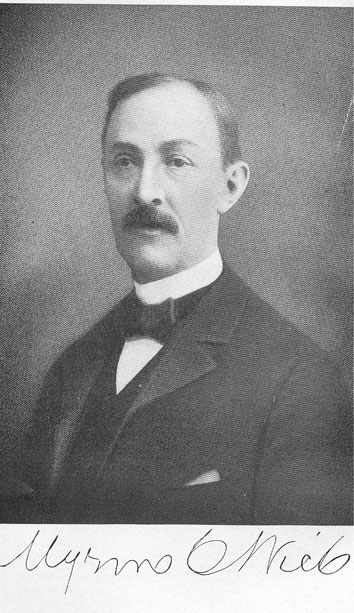
PHILIP AND MYRON C. WICK. One of the most widely known an highly honored pioneer families of Youngstown is the Wick family, which was established here in a very early day and has been represented here continuously since. Henry Wick, the progenitor of the family here, early had the sagacity and prescience to discern the eminence which the future had in store for this great section of the Buckeye commonwealth, and acting in accordance with the dictates of faith and judgment he and his descendants reaped in the fullness of time the benefits which are the just recompense of indomitable industry, spotless integrity and commendable enterprise. Few families of the county have played a better or more noticeable role in the general progress of the locality than this one, for while laboring for their individual advancement its members have never shrunk from their larger duties to civilization, and today they enjoy the respect and esteem of the entire community. As before stated, Henry and Hannah (Baldwin) Wick, great-grandparents of the subjects of this review, were the first of the family to settle in the Mahoning Valley. Of their children, Paul married Susan A. Bull and they became the parents of Myron C. Wick, father of the subjects. Myron C. Wick was born in Youngstown, Ohio, in 1848, and his death occurred here in 191o. He was a man of exceptionally keen business sagacity and succeeded in accumulating a comfortable estate. In early life he acquired large holdings in the old Cartright & McCurdy Rolling Mill and thereafter was the dominant factor in that concern until its absorption by the United States Steel Company. He seemed to have inherited that instinct for business which has been a characteristic of the Wick family. He was one of the organizers of the Dollar Savings and Trust Company and was a member of its directorate until his death. He was also a director of the New York Shipbuilding Company of Camden, New Jersey, a director of the F. B. Stearns Company of Cleveland, Ohio, and was closely identified with many enterprises which contributed to the development and upbuilding of Youngstown as a commercial and industrial center. Largely through his efforts the Youngstown Hospital, designed largely for the benefit of injured mill men, was built, and in this enterprise he maintained a deep interest. His all too brief career was replete with good deeds and to his descendants lie left the untarnished name he had inherited. He was one of the most unostentatious of men, open-hearted and candid in manner, always retaining in his demeanor the simplicity and candor of the old-time gentleman, and his record stands as an enduring monument, although his labors have ended and his name is but a memory. Myron C. Wick was twice married, his first wife having been Susan Winchell, who died, leaving one daughter, Laura. His second marriage was with Elizabeth Bonnell, who survives him, and the children born to this union are, Philip, Paul, Myron C. and Caroline B.
Philip Wick, the eldest of these children, was born on April 3, 1886, and after completing the course in the public schools attended Hill School at Pottstown, Pennsylvania, completing his technical studies at the Yale-Sheffield Scientific School. For some time thereafter he was connected with the Gary Iron and Steel Company at Cleveland, Ohio, but after the death of his father he returned to Youngstown to look after the affairs of the estate. In 1912 he organized the Youngstown Securities Company, of which he has been the only president. He is vice president and a director of the Trumbull Steel Company of Warren, Ohio, a director of the Ohio Iron and Steel Company, and a director of the First National Bank and of the Dollar Savings and Trust Company of Youngstown. Aside from his business interests he is deeply interested in everything that tends to advance the wellbeing of Youngstown and every worthy movement finds in him an ardent supporter. To his marriage with Clara Kenworthy, of Poughkeepsie, New York, which was solemnized on June 17, 1911, three children have been born, Elizabeth, Philip and Richard K.
Paul Wick was born on November 30, 1890, and he also completed his educational studies in the Hill School at Pottstown, Pennsylvania, and the Yale-Sheffreld Scientific School. He has become closely identified with large business interests, being vice president of the Falcon Steel Company of Niles, Ohio, and is a director of the First National Bank and the Dollar Savings and Trust Company of Youngstown. He served as ensign in the U. S. Navy during the world conflict. He was married to Almira Arms, and to them have been born two sons, Paul M. and William A.
Myron C. Wick, named in honor of his father, was born in Youngstown on October 24, 1892. Before the United States had entered the great. European struggle he went abroad and became a member of the American Ambulance Corps, connected with the French Army. Upon the entry of the United States into . the conflict he entered the Officers' Training Camp in France and was given a first lieutenant's commission. Thereafter until the close of the struggle he was at the front in active service with the French troops.
The two daughters of Myron C. Wick, Senior, Laura and Caroline B., and the youngest son, Myron C., are unmarried.
8 - YOUNGSTOWN AND THE MAHONING VALLEY
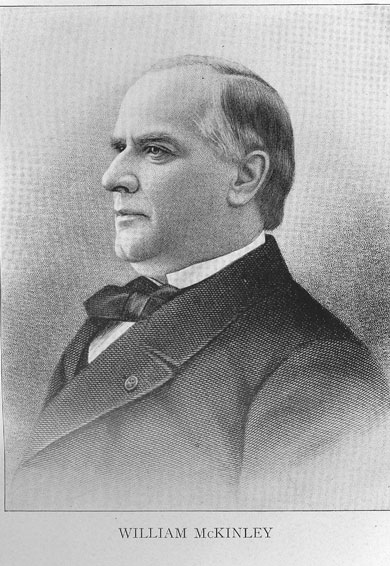
WILLIAM MCKINLEY, twenty-fifth president of the United States, was born in Niles, Trumbull County, Ohio, on the 29th of January, 1843. His ancestors on the paternal side were Scotch-Irish who lived at Dervock, County Antrim, and spelled the family name "McKinlay." His great-great-grandfather settled in York County, Pennsylvania, about i743, and from Chester County his great-grandfather, David McKinley, who served as a private during the war for independence, moved to Ohio in 1814. David's son, James, had gone in 1809 to Columbiana County, Ohio. His son, William McKinley (born 1807), like his father an iron manufacturer, was married in 1829 to Nancy Campbell Allison, and to them were born nine children, of whom William, the president, was the seventh. In 1852 the family moved to Poland, Mahoning County, when the younger William was placed at school. At seventeen he entered the junior class of Allegheny College at Meadville, Pennsylvania; but he studied beyond his strength and returned to Poland, where for a time he taught in a neighboring country school. When the Civil war broke out in 1861 he promptly enlisted as a private in the Twenty-Third Ohio Volunteer Infantry. He saw service in West Virginia, at South Mountain, where this regiment lost heavily, and at Antietam, where he brought hot coffee and provisions to the fighting line; for this he was promoted second lieutenant on the 24th of September, 1862. McKinley was promoted first lieutenant in February, 1864, and for his service at Winchester was promoted captain on the 25th of July, 1864. He was on the staff of General George Crook at the battles of Opequan, Fisher's Hill, and Cedar Creek in the Shenandoah Valley, and on the 14th of March, 1865, was brevetted major of volunteers for gallant and meritorious service. He also served on the staff of Gen. Rutherford B. Hayes, who spoke highly of his soldiery qualities. He was mustered out with his regiment on the 26th of July, 1865. Four years of army life had changed him from a pale and sickly lad into a man of superb and manly strength.
After the war McKinley returned to Poland, and bent all his energy on the study of law. He completed his preparatory reading at the Albany New York Law School, and was admitted to the bar at Warren, Ohio, in March, 1867. On the advice of an elder sister, who had been for several years a teacher in Canton, Stark County, Ohio, he began his law practice in that place, which was to be his permanent home. He identified himself immediately with the republican party, campaigned in the democratic County of Stark in favor of negro suffrage in 1867, and took part in the campaign work on behalf of Grant's presidential candidature in 1868. In the following year he was elected prosecuting attorney on the republican ticket. In 1871 he failed for re-election by forty-five votes, and again devoted himself to his profession, while not relaxing his interest in politics.
In 1875 he first became known as an able campaign speaker by his speeches favoring the resumption of specie payments, and in behalf of Rutherford B. Hayes, the republican candidate for governor of Ohio. In 1876 he was elected by a majority of 3,304 to the National House of Representatives. Conditions both in Ohio and in Congress had placed him, and were to keep him for twenty years in an attitude of aggressive and uncompromising partisanship. His congressional district was naturally democratic, and its boundaries were changed two or three times by democratic legislatures for the purpose of so grouping democratic strongholds as to cause his defeat, but he overcame what had threatened to be adverse majorities on all occasions from 1876 to 189o, with the single exception of 1882, when, although he received a certificate of election, showing that he had been re-elected by a majority of eight, and although he served nearly through the long, session of 1883-1884, his seat was contested and taken May 28, 1884, by his democratic opponent, Jonathan H. Wallace. McKinley reflected the strong sentiment of his manufacturing constituency in behalf of a high protective tariff, and he soon became known in Congress, where he particularly attracted the attention of James G. Blaine, as one of the most diligent students of industry, policy and questions affecting national taxation. In 1878 he took part in the debates over the Wool Tariff Bill, proposing lower import duties; and in the same year he voted for the Bland-Allison Silver Bill. In December, 188o, he was appointed a member of the Ways and Means Committee, succeeding Gen. James A. Garfield, who had been elected president on the preceding month and to whose friendship, as to that of Rutherford B. Hayes, McKinley owed much in his earlier years in Congress. He was prominent in the debate which resulted in the defeat of the Democratic Morrison Tariff Bill in 1884, and, as a minority leader of the Ways and Means Committee in the defeat of Mills Bill for the revision of the tariff in 1887 to 1888. In 1889 he became chairman of the Ways and Means Committee and republican leader in the House of Representatives, after having been defeated by Thomas B. Reed on the third ballot in the republican caucus for speaker of the House. On the 6th of April, 1890, he introduced from the Ways and Means . Committee the tariff measure known commonly as the McKinley Bill, which passed the House on the 21st of May, passed the Senate on the loth of September, as amended by the House, and was approved by the President on the first of October, 1890. The McKinley bill reduced revenues by its high and in many cases almost prohibitive duties; it put sugar on the free list with a discriminating duty 1 - 10 of one cent a pound on sugar imported from countries giving a bounty for sugar exported, and it gave bounties to American sugar growers; it attempted to protect many infant rndustries such as the manufacture of tin plate; under its provision for reciprocal trade agreements. Abroad where the bill made McKinley's name known everywhere there was bitter opposition to it and reprisals were threatened by several European states. In the United States the McKinley tariff bill was one of the main causes of the democratic victory in the Congressional elections in 1890, in which McKinley himself was defeated by an extraordinary democratic gerrymander of his congressional district. In November, 1891, he was elected governor of Ohio with a plurality of more than 21,000 votes in a total of 795,000 votes cast. He was governor of Ohio in
YOUNGSTOWN AND THE MAHONING VALLEY - 9
1892-95 being re-elected in 1893. His administration was marked by no important events except that he had on several occasions in his second term to call out the militia of the state to preserve order. But it may be considered important because of the training it gave him. in executive as distinguished from legislative work.
McKinley had been prominent in national politics even before the passage of the tariff measure bearing his name. In 1888, in the National Republican Convention in Chicago, he was chairman of the committee on resolutions and was leader of the delegation from Ohio, which had been instructed for John Sherman. After James G. Blaine withdrew his name there was a movement, begun by republican congressmen, to nominate McKinley, who received sixteen votes on the seventh ballot, but passionately refused to be a candidate, considering that his acquiescence would be a breach of faith toward Sherman. In 1892 McKinley was the permanent president of the National Republican Convention which met in Minneapolis and which renominated Benjamin Harrison on the first ballot, on which James G. Blaine received 182 votes and McKinley, in spite of his efforts to the contrary, received 182 votes. In 1894 he made an extended campaign tour before congressional elections, and spoke even in the South. In 1896 he seemed for many reasons the most available candidate of his party for the presidency. He had no personal enemies in the party; he had carried the crucial state of Ohio by a large majority in 1893; his attitude on the coinage question had never been so pronounced as to make him unpopular either with the Radical Silver Wing or with the Conservative "Gold Standard" members of the party, The campaign for his nomination was conducted with the greatest adroitness by his friend, Marcus A. Hanna, and in the National Republican Convention held in St. Louis in June he was nominated for the presidency on the first ballot by 661 1/2 out of a total of 906 votes. The convention adopted a tariff plank drafted by McKinley, and of far greater immediate importance, a plank which declared that the republican party was "opposed to the free coinage of silver except by international agreement with the leading commercial nations of the world, which we pledge ourselves to promote, and until such agreement can be obtained the existing Gold Standard must be preserved." This "Gold Standard" plank drove out of the republican party the silver republicans of the west, headed by Senator M. Teller of Colorado.
While his opponent traveled throughout the country making speeches McKinley remained in Canton, where he was visited by and addressed many republican delegations. The campaign was enthusiastic. The republican candidate was called the "Advance Agent of Prosperity," "Bill McKinley and the McKinley Bill" became a campaign cry. The panic of 1893 was charged to the repeal of the McKinley Tariff measure, and "business men" throughout the states were enlisted in the cause of "sound money" to support McKinley who was elected in November by a popular vote of 7,106,779 to 6,502,925 for Bryan and by an electoral vote of 2,871 to 176.
McKinley was inaugurated President of the United States on the 4th of March, 1897. The members of his cabinet were : Secretary of. State, John Sherman who was succeeded in April, i898, by William R. Day, who in turn was followed in September, [898, by John Hay ; Secretary of the Treasury, Lyman J. Gage, a gold democrat ; Secretary of War, Russell A. Alger; Secretary of the Navy, John D. Long; Attorney General, Joseph McKenna ; Postmaster General, James A. Gray ; Secretary of the Interior, Cornelius N. Bliss ; Secretary of Agriculture, James Wilson. Immediately after his inauguration the President summoned Congress in an extra session on the 15th of March. The Democratic Tariff in 1893 had been enacted as part of the general revenue measure, which included an income tax. The income tax having been declared unconstitutional by the Supreme Court, the measure had failed to produce sufficient revenue, and it had been necessary to increase the public debt. McKinley's message to the new Congress dwelt upon the necessity of an immediate revision of the tariff and revenue system of the country and the so-called Dingley Tariff Bill was accordingly passed through both Houses, and was approved by the President on the 24th of July.
The regular session which opened in December was occupied chiefly with the situation in Cuba. President McKinley showed himself singularly patient and self-controlled in the midst of the popular excitement against Spain and in the clamor for intervention by the United States in behalf of the Cubans ; hut finally, on the 23rd of March, he presented an ultimatum to the Spanish Government, and on the 25th of April on his recommendation, Congress declared war on Spain. During the war itself he devoted himself with great energy to the mastery of military details ; but there was bitter criticism of the War Department resulting in the resignation of the Secretary of War, Russell A. Alger. The signing of a peace protocol on the 12th of August was followed by the signature on the loth of December of articles of peace between the United States and Spain. After a long discussion the peace treaty was ratified by the United States Senate on the 6th of February, 1899; and in accordance with its terms Porto Rico, the Philippine Archipelago, and Guam were transferred by Spain to the United States and Cuba came under American jurisdiction pending the establishment there of an independent government. Two days before the ratification of the peace treaty, a conflict took place between armed Philippinos under the leadership of Emilio Aguinaldo and the American forces that were in possession of Manila. The six months that had elapsed between the signing of the peace protocol and the ratification of the treaty had constituted a virtual interregnum, Spain's authority having been practically destroyed in the Philippines and that of the United States not having begun. In this period a formidable native Philippino army had been organized and a provisional government created. The warfare waged by these Philippinos against the United States, while having for the most part a desultory and guerilla character, was of a very protracted and troublesome nature. Sovereignty over the Philippinos having been accepted by virtue of the ratification of the Paris treaty, President McKinley
10 - YOUNGSTOWN AND THE MAHONING VALLEY
was not at liberty to do otherwise than assert the authority of the United States and use every endeavor to suppress the insurrection. But there was bitter protest against this "Imperialism," both within the party by such men as Sen. George F. Hoar, and Eugene Hale, and Thomas B. Reed, and Carl .Schurz, and often for purely political reasons from the leaders of the democratic party. In the foreign relations of the United States as directed by President McKinley, the most significant change was the cordial understanding with the British Government, to which much was contributed by his Secretary of State, John Hay, appointed to that portfolio when he was Ambassador to the Court of St. James and which was due to some extent to the friendliness of the British press and even more markedly of the British navy in the Pacific during the Spanish war. Other important foreign events during McKinley's administration were : the annexation of the Hawaiian Islands in August, 1898 and the formation of the territory of Hawaii in April, 1909; the cessation in 1899 of the tripartite government of the Samoan Islands and the annexation by the United States of the islands including Pago-Pago. In two McKinley was unanimously renominated by the National Republican Convention, while Theodore Roosevelt, Governor of New York, was nominated for the vice presidency. The Republican Convention demanded the maintenance of a gold standard, and pointed to the fulfillment of some of the most important of the pledges given by the republican party four years earlier. The intervening period had been one of very exceptional prosperity in the United States, foreign commerce having reached an unprecedented volume, and agriculture and manufactures having made greater advancement than in any previous period of the country's history. The tendency toward the concentration of capital in great industrial corporatrons had been active to an extent previously undreamed of, with incidental consequences that had aroused much apprehension ; and the democrats accused President McKinley and the republicans of having fostered the "Trusts." But the campaign against McKinley and the republican party was not only "anti-trust" but "anti-imperialistic." William Jennings Bryan, renominated by the democratic party in July on a free silver platform, declared that imperialism was the "paramount issue" and made a second vigorous campaign; and the opposition to McKinley's re-election, whether based on opposition to his economics or his foreign policy, was not entirely outside of his own party. As the result of the polling in November 292 republican presidential electors were chosen, and 155 democratic electors, elected in Colorado, Idaho, Montana, Nevada, and the Southern states, represented the final strength of the Bryan and Stephenson ticket. The republican popular vote was 7,207,923 and the democratic 6,358,133. Since 1872 no president had been re-elected for a second consecutive term.
In the term of Congress, immediately following the presidential election it was found possible to reduce materially the war taxes which had been levied on the outbreak of the Spanish-American war. Arrangements were perfected for the termination of the American military occupation of Cuba and the inauguration of a Cuban Republic as a virtual protectorate of the United States, the American Government having arranged with the Cuban Constitutional for the retention of certain naval stations on the Cuban coast. In the Philippines advanced steps had been taken in the substitution of Civil Government for military occupation, and the Governor General, Judge William H. Taft, had been appointed and sent to Manila. Prosperity at home was great, and foreign relations were free from complications. The problems which had devolved upon McKinley's administration having been advanced toward final settlement, he retained without changing the cabinet of his first administration. After an arduous and anxious term the President had reached a period that promised to give him comparative repose and freedom from care. He had secured, through the co-operation of Congress, the permanent reorganization of the army and a very considerable development of the navy. In these circumstances President McKinley accompanied by the greater part of his cabinet set forth in the early summer on a tour to visit the Pacific Coast, where he was to witness the launching of the battleship "Ohio" at San Francisco. The route chosen was through the Southern states, where many stops were made, and where the President delivered brief addresses. The heartiness of the welcome accorded him, seemed to mark the disappearance of the last vestige of sectional feeling that had survived the Civil war in which McKinley had participated as a young man. After his return he spent a month in a visit at his old home at Canton, Ohio, and at the end of this visit by previous arrangement he visited the City of Buffalo, New York, in order to attend the Pan American Exposition and deliver a public address. This address, September 5, 1901, was a public utterance designed by McKinley to affect American opinion and public policy and apparently to show that he had modified his views on the tariff. It declared that henceforth the progress of the nations must be through harmony and co-operation, in view of the fast changing conditions of communication and trade, and it maintained that the time had come for wide reaching modifications in the tariff policy of the United States, the method preferred by McKinley being that if commercial reciprocity arrangements with various nations could be had, it should be made a law. On the following day, the 6th of September, 1901, a great reception was held for President McKinley in one of the buildings of the exposition, all sorts and conditions of men being welcome. Advantage of this opportunity was taken by a young man of Polish parentage, by name of Leon Czolgosz, to shoot, at the President with a revolver at close range. One of the two bullets fired penetrated the abdomen. After the world had been assured that the patient was doing well and would recover, he collapsed and died on the 14th. The assassin, who, it was for a time supposed, had been inflamed by the editorials and cartoons of the democratic opposition press, but who professed to hold the views of that branch of anarchists who believe in the assassination of rulers and persons exercising political authority, was promptly seized and was convicted and executed in October, 1901. McKinley's conduct and utterances
YOUNGSTOWN AND THE MAHONING VALLEY - 11
in his last days revealed a loftiness of personal character that everywhere elicited admiration and praise. Immediately after his death Vice President Roosevelt took the oath of office, announcing that it would be his purpose to continue McKinleyls policy, while also retaining the cabinet and principal officers of the Government. McKinley's funeral took place at Canton, Ohio, on the 19th of September, the occasion being remarkable for the public manifestations of mourning not only in the United States, but also in Great Britain and other countries. In Canton a memorial tomb has been erected.
Though he had not the personal magnetism of James G. Blaine, whom he succeeded as leader of the republican party and whose views of reciprocity he formally adopted in his last public speech, McKinley had great personal suavity and dignity and was thoroughly well liked by his party colleagues. As a politician he was always more the people's representative than their leader, and that "he kept his ear to the ground," was the source of much of his power and at the same time was his greatest weakness. His address at Buffalo, the day before his assassination, seems to voice his appreciation of the change in popular sentiment regarding the tariff laws of the United States and is the more remarkable as coming from the foremost champion for years of a form of tariff legislation devised to stifle international competition. His apparently inconsistent record on the coinage question becomes consistent if considered in the same way, as the expressing of his gradually changing views of his constituency. And it may not be fanciful to suggest that the obvious growth of McKinley in power and growth during his term as president was due to his being the representative of a larger constituency, less local and narrow minded. He was an able but far from brilliant campaign speaker. His greatest administrative gift was a fine intuition in choosing men to serve him. McKinley's private life was irreproachable; and very fine was his devotion to his wife, Ida Saxton (died in 1907), whom he married in Canton in 1871, and who was, throughout his political career, a confirmed invalid. He was from his early manhood a prominent member of the Methodist Episcopal Church.
SERVETUS W. PARK. A definite place of honor in the history of Warren has been earned by Servetus W. Park. His personal association with the Mahoning Valley goes back ninety years, while his consequential connection with affairs of importance of Warren extends back seventy years. That is a remarkable record; more remarkable when it is realized that even yet, notwithstanding nonagenarian age, Servetus W. Park is still an active factor in the administrative affairs of one of the leading banking institutions of the City of Warren and is also interested in the management and direction of other industrial and public activities in that city. his record is unique among the men of affairs of Warren, if not of the entire country. He was an educator in Trumbull County in 1847, was a medical student in the city a little later, was in substantial wholesale business in Warren for forty years, and he is the dean of the bankers of Warren. He has had important part in the development of many local institutions. He was one of the organizers of the Trumbull National Bank of Warren in 1865, and held responsible connection with that institution for many years, and was one of the principals responsible for the re-organization of the bank in 1889, when it became the Western Reserve National Bank. For very many years he was its president, and since 1918 has been chairman of its board of directors. He is the chief executive of many other Warren institutions and enterprises, among which is the Warren Operahouse Company, of which he is president; he was one of the founders of the Warren Public Library Association, of which he has been trustee since its inception. It will therefore be seen that Mr. Parkls long life has been one of meritorious endeavor, centered around the City of Warren, the prosperity of which he has ever been eager to further.
He was born at Moriah, Essex County, New York, on July 5, 1829, the son of John and Sophia (Broughton) Park. The Parks are of English origin, but among the colonial New England descendants, an honorable record of the family can be found in the early annals of Vermont, in which state the family in its early American generations lived. Elijah Park, grandfather of Servetus W., was born at Wells, Rutland County, Vermont, where he married, his wife's given name being Margaret although what her patronymic was does not appear in data now available. Their son John, father of Servetus W., was born in the family homestead at Wells, Vermont, May 22, 1794. He married Sophia Broughton on December 5, 1816, and to them were born four sons and one daughter, all the children excepting the youngest being born in Wells, Vermont. The youngest child, Servetus W., who is now the only survivor of the children of John and Sophia (Broughton) Park, was born in Moriah, New York. Their five children, in order of birth, were: Samuel ; Cephas; John H.; Rachael, who married Judge C. W. Smith; and Servetus W.
The life of John Park is worthy of further record in this history of the Mahoning Valley ; in fact, it has particular interest, for he was one of the pioneer settlers of the section. After leaving his home state, Vermont, John Park for some years lived in Essex County, New York, but in the spring of 1831 decided to go and prepare a home for his wife and children amid the greater possibilities of the rich but undeveloped territory of the frontier states. The journey was undoubtedly adventurous, and the rigors of the next decade in the life of the Park family would probably be severe; yet in John Park was the true pioneering spirit, and he knew that he had the will to eventually win from the wild state a property from which he and his family could gain ample sustenance. Leaving his wife and children in their New York state home, he went westward with another pioneer, John Folsom, and the two purchased a tract of 552 acres of wild land in Weathersfield Township, Trumbull County, Ohio, of which John Park eventually received clear title to 184 acres. He prepared a habitation for his family upon the land during the summer of 1831, and in the fall of that year returned to New York state for his family. The long journey had perforce to be made in a
12 - YOUNGSTOWN AND THE MAHONING VALLEY
wagon, and at that time Servetus W. was only two years old. The family arrived eventually at their new home without serious happening; and for some years thereafter they lived the life of pioneers upon their Weathersfield Township property. Later, however, John Park sold the land and acquired another property near Niles, Trumbull County, and there spent his remaining years. The Park family, at least in the paternal line, is remarkable for its longevity, John Park being ninety-seven years old in the year of his death, while his son, Servetus W., is still comparatively vigorous, notwithstanding that he also is a nonagenarian. After the death of his first wife, Sophia Broughton, who died on January 3, 1854, John Park married in 1855 Mary A. Cline, who bore him three children, Mary, Seth and Cora. John Park was a man of strong personality and honorable life, and was widely known among agriculturists of Trumbull County.
Servetus W. Park, son of John and Sophia (Broughton) Park, was reared in the wholesome environment of his parents' farm, and gained his elementary education in the common schools of the county, eventually becoming a student at the old Warren Academy. He appears to have had inclination to follow professional occupations, and for four years prior to attaining majority he taught in various schools of the district. He seems to have had manful purpose in this work, for the money he gained by teaching he applied mostly to the commendable use of clearing his father's farm of debt, he being the chief factor by which the final payments on the family property were made. In 185o Servetus W. evinced a desire to prepare for admittance to the medical profession, and with that object began to read medicine in the office of Drs. Daniel B. and John R. Woods of Warren. In that phase of his life he again manifested stalwart purpose, resolving that he would obtain his medical education without burden to his parents; and to effect that purpose he maintained himself by pharmaceutical work in the drug store of W. W. Collins of Warren during the two years of his studentship. And during those years wonderful reports had come of the possibilities of California, which had been annexed in 1848, the year in which gold was discovered at Captain Sutter's mill. In 1853 young Park gave up his professional studies, and in February of that year formed a small party and went to California, making the journey via the Isthmus of Panama. He settled in San Francisco and -entered in commercial business, forming the firm of Park and Tyler, which from 1854 to 1858 did a comparatively satisfactory business in books and stationery in San Francisco, which at that time was practically of mushroom growth and in its first decade ; in fact, San Francisco was a village of only 450 population in 1847, when its name was changed from that of Yerba Buena to its present designation, but during the next decade its population rapidly increased until it had passed fifty thousand. In such a new community much lawlessness and defective civic administration were of course to be expected; but conditions became so intolerable, and the municipal government so corrupt or incapable of enforcing the laws, that the respectable citizens during the period 1851-1856, to protect themselves, organized vigilance committees, which summarily dealt with a number of public criminals, and eventually reduced the others to subordination. Mr. Park took manly part in the endeavors of the vigilance committees during the years of his residence in San Francisco, and strove to inaugurate a better state of civic affairs. In 1858 he left San Francisco, and for a while traveled through the western states looking for suitable business points, eventually, however, settling in the City of Louisville, Kentucky, where he became a member of the commission and forwarding firm of N. S. Glore & Company of that city. Seeking business for the firm, Mr. Park traveled extensively throughout the southern states, and during those years of travel he saw inevitably approaching the Civil war. Not wishing to be identified with a Confederate state in such a circumstance, he disposed of his business interests in Louisville, Kentucky, and returned to Ohio, and to the City of Warren. There he became a member of the firm of 0. H. Patch & Company, wholesale dealers in saddlery and harness hardware. The business was a substantial one at the time of the commencement of the Civil war, and its continuance in great measure became the responsibility of Mr. Park, the senior partner, Mr. Patch, having reached an advanced age, and the other junior member of the firm, Emerson Opdike, having enlisted in the military forces of the Union. Thus Servetus W. Park was debarred from personal part in the Civil war. He took over the entire management of the business of 0. H. Patch & Company, of which he eventually became the sole owner, conducting it with good- success until 1906, when he retired altogether from commercial business, being at that time seventy-seven years old. During the sixteen years from then to the present, however, Mr. Park has continued to actively participate in the direction of other financial and business interests and in civic affairs. His record as a banker covers, and creditably, a period of fifty-five years. He was one of the founders of the Trumbull National Bank of Warren in 1865, although he did not become one of its directors until some years thereafter. He was also prominent in the re-organization of the Trumbull National Bank in 1889, when it took the name it has since been known by, that of the Western Reserve National Bank. Until January I, 1918, Mr. Park was president of the bank, and his resignation was directly the outcome of injuries sustained by him in a runaway accident a little while previously, from the effects of which, at his advanced age, he found recovery somewhat slow, but he still holds an office of honor and responsibility in the administration of the bank, being the chairman of its board of directors. His business interests include those of the Ohio Varnish Company of Cleveland, of which he is president and was one of its organizers, and of which he is one of the principal stockholders.
His interest in educational matters has for very many years been evident. He has actively furthered many movements that had bearing upon educational facilities within the city. He has always been studiously inclined, and is a well-read man. That is emphasized by the scope of his private library; and it was in that home library that Mr. Park met and deliberated with other public-spirited citizens in the
YOUNGSTOWN AND THE MAHONING VALLEY - 13
hope of bringing into being a public library association. The outcome of that meeting was the eventual establishment of the Warren Public Library, of which Mr. Park has been trustee since its inception. It must be particularly gratifying to him, an enthusiast and authority on matters bibliographical, to realize that out of his initial endeavor have sprung the splendid public library facilities Warren now has. Much more concerning the public activities of Mr. Park during his long residence in the City of Warren ould be written if available space permitted, but
has been sufficiently reviewed herein to some extent the worthy part he has taken of Warren during the last fifty years. He among its leading citizens and public workers for a longer period than any other living resident, and he has an enviable repute throughout the Mahoning Valley.
In 1858 Mr. Park married Priscilla A., daughter of Edward and Mary (Matthews) Welsh. She died on June 5, 1875, having borne to the marriage two children: Illa W. married David J. Kurtz, who died in August, 1919. Their son, Park Kurtz, married Martha Cook. Carrie L., who married Frank W. Harrington, died in October, 1893. To them was born Charles A. Harrington, now of Youngstown, who married Eva Smith, of Green Township, Trumbull County, to whom these children, Robert A., Jean Park and Edwin Wakefield were born, and a daughter, Priscilla, married to Frank W. Chapman of Chicago. More than ten years after the demise of is wife, Priscilla A. Welsh, Mr. Park, on September 17, 1885, married again, his second wife being Lucia A. Darling, of Akron, Ohio, a niece of Governor Sidney Edgerton. She was a woman of high attainments. After graduating at Oberlin College she entered upon an academic career, and for eleven years was principal of the women's department of Berea College, Kentucky. She died on August 18, 1905.
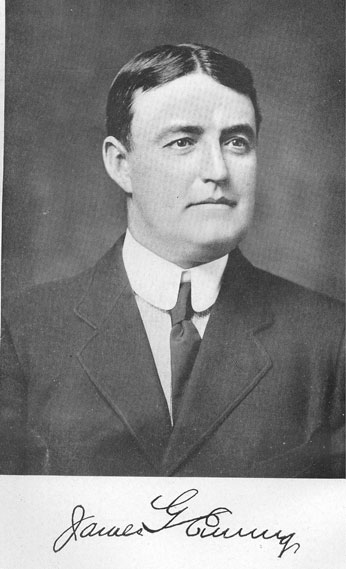
JAMES GIBSON EWING. The Ewing family is one of the oldest and most important families of Mahoning County, and one of its representatives, now deceased, who impressed his personality on Youngstown and the surrounding territory, and lived up to the highest standards of the Ewings, was the ate James Gibson Ewing. He was born on a farm in Jackson Township, Mahoning County, Ohio, September 3o, 1867, and died at Youngstown, on August 7, 1915, in the very prime of useful manhood and constructive citizenship.
James Gibson Ewing was a son of John and Margaret (Sterritt) Ewing, grandson of John and Margaret (Orr) Ewing, and great-grandson of Alexander and Ann Ewing. The last two mentioned
were born, reared and married in the north of Ireland, where their children were born. Archibald, who married Sarah Pauley, John and Catherine accompanied their widowed mother, Ann Ewing, to Austin Township then a part of Trumbull County, a part of Mahoning County, Ohio, in 1802, and or, who married William McElwee, remained in Broughton, Allegheny County, Pennsylvania. After the death of Alexander Ewing in Ireland, his widow courageously set forth with her children and landed at Wilmington, Delaware on September 5, 1792, from which they journeyed to Center County, Pennsylvania, and lived there until 1802, when they came to Ohio, and secured land in Austintown Township, Mahoning County. This original farm of the Ewings has never left the family, and is now owned by Frank R. Ewing. It was on this farm, near Ohls Crossing that the beloved mother, Mrs. Ann Ewing departed this life on March 12, 1824, aged eighty-five years.
The elder John Ewing selected his farm in Jackson Township, Mahoning County, adjoining the original Ewing homestead, and took to it a bride, Margaret Orr, to whom he was married in 1805, theirs being the first white marriage celebrated in Jackson Township, and their first child, Mary, was the first white child born there. Their other children were as follows : Eleanor, Margaret, Alexander, Marjorie, Anna Sarah, Gibson, Martha, Catherine, John and Rebecca.
John Ewing of the above named children, and father of James Gibson Ewing, grew up in Jackson Township, alternating attendance at the district school with farm work, and after he attained to years of maturity he engaged in farming and stockraising. Owing to his generosity in trusting too many of his customers in his stock business and accepting script that later proved to be worthless, he died a poor man. Later in life he lived at Canfield, Ohio, but passed his last years at Youngstown, where he died on June 12, 1907, his wife having passed away on June 1, 189o.
James Gibson Ewing was one of eight children born to his parents, namely : Samuel Oliver ; Francis G.; Joseph R.; Mary Elizabeth, who married J. E. Kirkpatrick; Sarah Eleanor, who died unmarried in 1913; John Calvin and Margaret A., twins, the former of whom is written up elsewhei c. in this work, while the latter died unmarried in 18e3; and James Gibson.
Although his educational advantages were limited to those offered by the district schools of Mahoning County, and the Northeastern Normal College at Canfield, Ohio, James Gibson Ewing was so naturally intelligent and capable that he had no difficulty in securing a certificate to teach from the county superintendent of schools, and entered the educational field, in which he continued until he moved to Youngstown to serve as deputy under his brother, Sheriff Samuel Oliver Ewing. After making a splendid record for himself in that capacity, Mr. Ewing began building and through his industry and judicious operations acquired a comfortable fortune, and at the same time rendered his city very valuable service, doing much in the way of opening streets and erecting permanent structures at Youngstown. He was a man of broad vision and could see possibilities in new communities, as his beautiful addition named Bonnie Brae, to Warren, Ohio, proves, as the latter has developed into one of the flourishing communities of this region. It was while he was engaged in this work that Mr. Ewing was stricken with appendicitis, which proved fatal. A strong republican, he served very creditably as a member of the Youngstown City Council, and member and chairman of the Republican County Com-
14 - YOUNGSTOWN AND THE MAHONING VALLEY
mittee, and as an official and private citizen always took a keen interest in all movements he deemed would prove beneficial to his city, county or state. Mr. Ewing was reared in the faith of the Covenanters, and as he grew older joined the United Presbyterian Church.
James Gibson Ewing was united in marriage with Minnie F. Murphy, a daughter of Henry Murphy, and they became the parents of two children, namely : Harry G., who is mentioned below ; and James Arthur, who died January, 1906, aged twelve years.
Harry G. Ewing has spent his entire life at Youngstown, where he attended school and was graduated from the Rayen High School. Subsequently he matriculated at the Western Reserve University and following his completion of its course, has been connected with the business established by his father, to which he succeeded upon the death of the latter. Mr. Ewing inherits his father's capabilities in this direction and bids fair to further expand the scope of his operations.
On April 28, 1917, Harry G. Ewing was united in marriage with Miss Winnifred E. Jacobs, a daughter of Thomas A. Jacobs of Youngstown. Mr. and Mrs. Ewing have one daughter, Nancy Armstrong Ewing. Mr. Ewing has found at Youngstown the inspiration he needs, and his abilities are such as to assure for him a development equal to that achieved by his father. Realizing that business is the very life blood of the nation's prosperity, Mr. Ewing feels that in his work he is accomplishing his life work, and helping to maintain the prestige of his family.
HUGH D. MORGAN, who was born at Youngstown, in addition to is chosen work as a dental surgeon has rendered a service not easily overlooked in the direction of giving larger and broader opportunities to thy people of the community, and has taken a notable part in securing for his city a proper field for the development of healthful pleasure, so that his recent appointment as a member of the Youngstown Park Board met with general approval.
Doctor Morgan was born at Youngstown December 23, 1873, a son of David S. and Elizabeth (Jones) Morgan. His parents came to the United States from Wales about fifty years ago, following their marriage, and located at Youngstown. David S. Morgan worked in the mines, and was a republican voter from the time he received his naturalization papers. He and his wife were active in the Welsh Congregational Church.
Fifth in a family of fourteen children, Hugh D. Morgan after a brief schooling spent several years working for John Stambaugh in the William Tod plant at Youngstown. His sincere, straightforward nature won him friends and the confidence of his employers. He was advanced to moulder, and his proficiency would undoubtedly have gained for him a much larger place in the iron and steel industry had he chosen to remain. However, he determined to become a dentist. Without sufficient capital to put him through a professional school, he relied upon the credit reposed in him by those familiar with his work and character, and had no difficulty in borrowing a sufficient amount to carry h' through the courses of the Ohio State University. He was graduated there in 1905 and later from Cleveland Ohio School of Dentistry. He then returned to Youngstown and established himself practice and has built up a large patronage. Throu his early work in his profession he cleared up obligations incurred while attending school. Doctor Morgan still retains his membership in the Iron Moulders' Union, and has many strong friendship among his former fellow workmen.
January I, 1910, Doctor Morgan married Mi Edith Edwards, daughter of David T. Edward. Her father was one of the notable men of Youngstown, at one time an employe of the old Youngstown Rolling Mill and for many years a strong advocate of the single tax principle. Doctor Morgan is a,. Mason. Realizing the benefits a community receives from public parks, Doctor Morgan, naturally an outdoor man, has sought to have the present system expanded and improved, and his efficient work in that connection made him the logical candidate for membership on the park board, so that his appointment to that position by Judges Anderson, Jenkins and Cooper is very satisfactory to all classes.
THOMAS GORDON BLACKSTONE. The history of munrcrpal progress a and improvement in the City of Girard during the past thirteen years is largely an index of the able service rendered by Thomas Gordon Blackstone as mayor of that city. The people of Girard speak with much pride of their popular mayor, and few men have served so many years in such an office. He was first elected mayor in 1906 and consecutively through 1909, he was again chosen in 1912, again serving for four consecutive years. Then after an interval of two years he was made mayor in 1918 and his present term extends to 1921.
Mr. Blackstone has long been identified with the local business affairs of Girard. He was born on a farm near Greenfield in Mercer County, Pennsylvania, May 22, 1865. His birthplace was near that of A. M. Byers, whose industrial leadership has had so much to do with the history of Girard. His parents were William and Sarah Isabel (Porter) Blackstone, the former a son of George Blackstone and born on the farm where he spent his active years. William Blackstone died in 1907 at the age of seventy-six. In youth he had learned the tailor trade but practically all his life depended upon farming as a means of livelihood. He was of Scotch Irish ancestry. His wife Sarah Isabel Porter wa of remote German descent, her people coming fro Eastern Pennsylvania to Mercer County. She die in 1880, having been born in 1834. William Black stone married for his second wife Sarah Jewell who is now eighty years of age and since the dea of her husband has lived at Mercer, Pennsylvania. William Blackstone was prominent in local affair in his section of Pennsylvania, is a member of th board of trustees of the township, and was a leade in every movement to promote education and reli gion. The family were devout Presbyterians and on of the features of his early home life which Mayo
YOUNGSTOWN AND THE MAHONING VALLEY - 15
Blackstone recalls with the greatest pleasure was the Sunday evenings at the old homestead when parents and children, all good singers, gathered together and sang the old Gospel hymns. William Blackstone was a democrat in politics. There were eight children in the family and all are still living: Perry C., a contractor at Youngstown ; Ess Braden, a farmer at North Henderson, Illinois ; Charles H., a resident of Mercer ; Ida L., wife of L. J. Rogers, a farmer in Lawrence County, Pennsylvania; Thomas G.; Calvin R., who is in partnership with his brother Thomas in the dray and transfer business at Girard ; Mary, wife of J. N. Hughes, a stock dealer of Mercer County; and Bruce R., who was formerly a lumber man and is a resident of the State of Washington.
Thomas Gordon Blackstone spent his early life on the home farm, attended the nearby schools, where the usual school term began at the. close of corn shucking time in the fall and lasted until the sap started flowing in the maple trees in the early spring. At the age of nineteen and continuing for three years he worked with a cousin James Blackstone, buying and shipping cattle to eastern markets, usually to Jersey City. After his marriage Mr. Blackstone was a carpenter one year, and in 1889 came to Hazelton and was employed in the Andruss plant. He has been a resident of Girard since 1894. His first employment was with the A. M. Byers plant. He was the train crew for the Dinky dummy train, acting as brakeman and conductor combined for $1 a day, while his wife's father was engineer. Later he was promoted to blast furnace work, and after three years with the Byers Company he went to a farm he had bought in Pennsylvania and tilled the soil four years. Returning to Girard in 1902 Mr. Blackstone became associated with King Brothers' furniture and undertaking establishment. He made a thorough study of embalming, and remained with King Brothers three years. In 1907 during his second year as mayor of Girard he engaged in the undertaking business for himself, and has since, in Association with his brother, added a dray and transfer business.
Mayor Blackstone is a republican, a member of ,the Girard Board of Trade, is affiliated with the Junior Order United American Mechanics, the Protive Home Circle, the Knights of Pythias, and is n active Presbyterian, serving as a member of the oard of trustees of the church and superintendent f the Sunday school. In December, 1887, he maried Minnie Everhart, daughter of Fred Everhart of Greenfield, Pennsylvania. She was born April 20, 1866. They have a son Thomas G., Jr., and an adopted daughter Ellen.
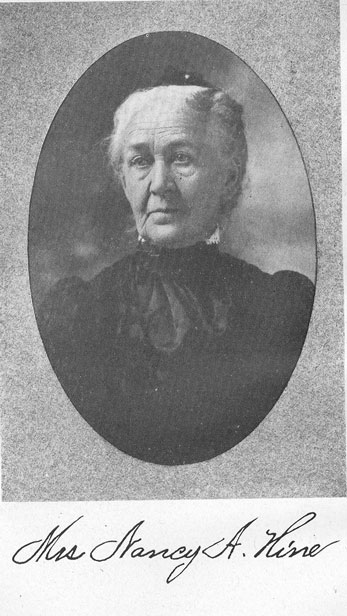
MRS. NANCY HINE In her ninety-third year Mrs. Hine retained her physical and mental facuity to a marked degree, and by her own life and experience is one of the most interesting links between the bustling modern present and the pioneer history of the Mahoning Valley. Mrs. Hine belonged two of the oldest and most historic families of Mahoning County. Her own people were the Gibsons, while she was widow of the late Abraham Skinner Hine, a family whose membership has included some of the best people in Eastern Ohio, not only in recent times but in the pioneer epoch.
The history of the Hine family in America goes back to Thomas Hine, who probably came from England and was a resident at Milford, Connecticut, of recorded date January 28, 1646. His will was made in 1694. His son Samuel Hine was born January 26, 1659-60. The third generation is represented by James Hine, son of Samuel and Abigail, who was born at Milford October i6, 1696, and was known in early Connecticut annals as Lieutenant Hine. He settled at New Milford about 1723. He died April 1, 1774. He was not only a large property owner but his name frequently appears in connection with colonial affairs, including membership in the General Assembly.
Noble Hine, son of Lieutenant James and Margaret (Noble) Hine, was born at New Milford August 12, 1744, and served as an ensign in Colonel White's Regiment, Captain Cowles Company, during the Revolutionary War. He represented his district in the State Legislature many terms. He died October 1, 1796.
Homer Hine, son of Noble and Patience (Hulbell) Hine, became a distinguished character Eastern Ohio, and was father of Abraham Skinner Hine. He was born at New Milford July 25, ____
and graduated with the class of 1799 from College. One of his classmates was Dr. Lyman Beecher, father of Henry Ward Beecher. A graduate of Yale just a century later was his great-grandson, the noted American author Gouverneur Morris Homer Hine after studying law was admitted to the bar in 1801, and soon afterward came on horseback to the Ohio Western Reserve. He lived at Canfield and in Youngstown, and from 1804 to 1834 was almost continuously a representative in the Ohio Legislature. He was not only an able lawyer, but a man of broad scholarship, and in the absence of a regular minister frequently read sermons in church. When about sixty years of age he retired from practice, and he died July 14, 1856. His home in Youngstown was at Crab Creek, and the Lake Shore depot now stands on part of his old garden. He owned l00 acres there. While he attended the Presbyterian Church he never united with it formally until old age. He was a stockholder in the canal, which took a part of his time. He was associated on terms of friendship as well as professionally with such prominent Mahoning County characters as Judge Newton of Canfield, and also the Whittleseys of Canfield.
October 18, 1807, Homer Hine married Mary Skinner, daughter of Abraham and Mary (Ayers) Skinner of Painesville, Ohio. She was born September 20, 1789, and died December 18, 1882. She had come with her parents to Hartford, Connecticut, in 1805. Her father, Capt. Abraham Skinner. was an officer in the American Revolution and became an extensive land owner in Northeastern Ohio, owning land on which the City of Painesville was built. The children of Homer Hine and wife were Mary Sophia, Henrietta Maria, Samuel, Abraham Skinner, Homer Hubbell, Augustus, Junrus and Julius, twins. Samuel died at Poland at the age of seventy-seven; Homer, at Painesville, also aged
16 - YOUNGSTOWN AND THE MAHONING VALLEY
seventy-seven ; and Augustus at Los Angeles at the age of eighty-three. Samuel was at one time a merchant at Hubbard, and his son Cecil is a well known Youngstown attorney. The daughter Mary Sophia Hine became the wife of Henry Wick, of the prominent Wick family of Youngstown, and later a Cleveland banker. Mary died at the age of eighty- eight. Henrietta Hine married Dudley Baldwin, a Cleveland business man, and died at the age of eighty-six.
Abraham Skinner Hine was born at Crab Creek in Youngstown February 28, 1818, and died March 9, 1866. He was injured on his forty-eighth birthday while tearing down an old building for the purpose of erecting a sugar house in his maple grove. He was known as a capable farmer, and by his own character shared in the honor and esteem paid the Hine family.
October 19, 1848, Abraham Skinner Hine married Nancy Adaline Gibson. Mrs. Hine was born May 21, 1827, a daughter of Robert and Lydia (Marshall) Gibson. Her father, Robert Gibson, was born in Pennsylvania in 1783 and came to Ohio in 1799 with his father, James Gibson, who had been a soldier in the Revolutionary war. The original Gibson farm in Mahoning County is now in the city limits, where the new hospital is being erected. Many of the Gibson family are still represented in Mahoning County.
Mrs. Nancy Hine, though the interests of her mind had touched many subjects and remote places and peoples, has had her personal associations with only two or three homes. At the age of thirteen she moved from a log to a stone house on her father's place. That stone house is still standing and on the ground incorporated in the new park at Youngstown. When she was married more than seventy years ago she came to the farm three miles from the courthouse on the Youngstown-Poland Road, and began housekeeping in a home that had been started by a Mr. Stahl, but was still in an unfinished condition when Mr. and Mrs. Hine went there to live. Most of the timbers of that old home are still retained in the remodeled dwelling, which was thoroughly modernized in 1914. The first year Mrs. Hine cooked the meals at a fireplace. The land of this farm, containing originally 121 acres, had .been bought by Homer Hine in 1836. Except about twenty acres immediately surrounding the home all the farm has since been sold to a Realty Company and has been divided and is now rapidly being dotted with homes.
Mrs. Nancy Hine was the mother of the following sons and daughters : Thalia, Henrietta Emma, Adaline Gibson, Mary Ayres, Alice Hine, Anna Belle and Oliver Skinner. The daughter Thalia, born in 1849, became the wife of Rev. Hugh Porter Wilson on September to, 1873. He had been a Union soldier in the Civil war, afterwards became a Presbyterian minister, and died as a result of his early war service in Oklahoma in 1895. His widow is now living with her sister and mother. Her son Chalmers Blakelee is an attorney at Enid, Oklahoma; Homer is in the real estate business at Los Angeles ; Curtis is a member of the staff of the Times at Los Angeles ; Oliver is in the real estate business at Los Angeles; Dudley is proprietor of a drug store at
Girard, Ohio; and Alice is Mrs. George Zellers of Youngstown.
Henrietta, who was born in 1851, was married in 1872 to George Edwards, who died at the age of thirty-nine. Mrs. Edwards, who lives at Los Angeles, has two living children, Clyde H., of Washington, D. C., and Mary Ada, a teacher in the Girls Collegiate School at Los Angeles.
Adaline G. Hine, born in 1853, retired in 1917 after a long and active career as a teacher. She graduated from the Poland Union Seminary and later taught there. She was also an instructor at Oberlin College with her sister Mary, taught in the public schools of Oberlin, spent two years at Mount Ayr, Iowa, also taught in Canfield, and in 1889 went to Cleveland, where she was principal of the Barkwill, the Tod and the Quincy schools. She has been active in club and literary work, in the Presbyterian Church and in recent years has devoted herself to her home and her mother.
The daughter Mary, born in 1854, died in 1898, and though on account of an accidental injury in girlhood she never enjoyed strong health, she became a successful teacher and for several years taught at Oberlin.
Alice, born in 1857, was married in 1886 to William Brainard McCarthy and died at Huntingdon, Pennsylvania, in 1897. She and her husband had taught in the Poland Union Seminary prior to their marriage. She was the mother of four children: Thalia Veda, wife of J. B. Stolper, an author and teacher of English in the high school at Newark, New Jersey; John Russell McCarthy, who is an author and newspaper man and lives at Huntingdon, Pennsylvania, and some of his poetry has been accorded enthusiastic commendation by the great naturalist John Burroughs ; Alice, who is living in Vermont; and Vernon, of Huntingdon, Pennsylvania.
Anna Belle, born in 1860, became the wife of Rev. Charles F. Hook in 1891 and lives at Hudson, New York. Their children are Charles Homer, a teacher ; Marshall, Archie and Clark.
Oliver Skinner Hine, the only son, was born July 8, 1865, spent his life as a bachelor, living at home with his mother, and died in 1917. He was always very progressive, in favor of all new moves. His father died when he was eight months old. He was raised on the farm and went to school in Poland at Union Seminary. At sixteen he left school and took up the active work on the farm with his mother. He led a strenuous life and a very successful one, being one of the best farmers in the Mahoning Valley. He was especially interested in stock and raised fine Holstein cattle. He was a member of the Sons of the Revolution, and the Independent Order of Odd Fellows, and was greatly interested in them.
Mrs. Hine and her six daughters all taught school. Mrs. Hine was eligible for membership in the Daughters of the American Revolution. Her daughters are doubly eligible, being qualified on both the maternal and paternal side.
At the venerable age of ninety-three, came the closing of the good, gentle and noble life. Retaining her vigor, activity and her keen interest in current affairs, her clear strong intellect to the last. Monday before the passing she told her family that it was the first day she was unable to read her New
YOUNGSTOWN AND THE MAHONING VALLEY - 17
York Times. She left many friends to mourn her death.
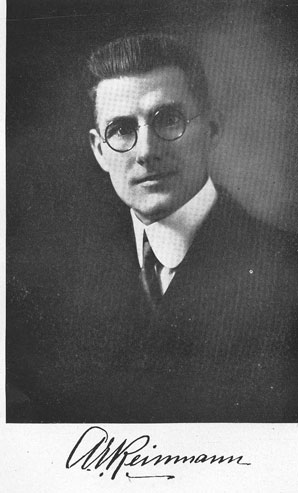
ALFRED E. REINMANN. It is not strange that the people of the little republic of Switzerland should come to the United States and establish homes for our institutions in many respects are similar to their own and they do not have such a hard time adjusting themselves here as do the emigrants from other countries of Europe, born and reared under conditions which are just about the antithesis of our own. The ports of entry to the western republic have ever been open to the Swiss, and now their thriving farms, substantial homes and places of business are found all over the country. They have been loyal to our institutions and have proven to be splendid citizens in every respect.
Alfred E. Reinmann is a native of Berne, Switzerland, where he was born on March 23, 1882, a son of Samuel Reinmann. He received his educational training in schools at Zurich and Paris, thus gaining a good knowledge of French. In 1901, two years before attaining his majority, Mr. Reinmann left his native land for the United States, arriving here in September of that year. He immediately came to Youngstown, Ohio, and his first employment after arriving here was in digging a cellar on Federal Street. He was energetrc and ambitious and stopped at nothing in the way of honest employment, selling newspapers, working on farms and at anything he could find to do. In the meantime he took special instruction from the teachers of the Rayen High School, making such progress that he was enabled to enter the Wisconsrn State University at Madison, where he completed his third year. Rementurning to Youngstown he entered the Dollar Savings and Trust Company in the capacity of messenger, and was later advanced to the position of teller. In 1905 he entered the services of the Equity Savings and Loan Company, of which he became treasurer. In 1912 he organized the Central Savings and Loan Company, and in 1916 the Central Bank and Trust Company. Mr` Reinmann is president of the above bank, and secretary and manager of the Loan Company.
In 1907 Mr. Reinmann was married to Dorothy F. Ullmann and they are the parents of three children, Dorothy May, Alfred E., Jr., and Myron E.
Mr. Reinmann is a member of the Reformed Church, and socially is identified with the Youngstown Club. He is a member of the Free and Accepted Masons, in which he has attained the thirty-second degree of the Ancient Accepted Scottish Rite, and also belongs to the Ancient Arabic Order Nobles of the Mystic Shrine and the Knights of Pythias. With few opportunities except what his own efforts were capable of mastering, and with many discouragements to overcome, he has made a !success in life. He is regarded as a good business ;man, possessing sound judgment and keen foresight, and he enjoys to a notable degree the confidence and respect of his business associates. He takes a proper interest in the affairs of the community, giving his unreserved support to all movements for the advancement of the general welfare of the people.
C. H. WILTSIE is proprietor of the Main Hardware Company of Niles. This is an old established business, with a large trade and prosperous connections, and its scope has been greatly extended under Mr. Wiltsie's management.
The father of the Niles merchant is Nathan C. Wiltsie, a wealthy and substantial business man whose interests were widely dispersed over Western Pennsylvania and New York. Most of his life he has been a lumber manufacturer and dealer, with mills at Garland, Byronstown, Pennsylvania, and other places. He is a man of affairs, with business holdings at Buffalo and Jamestown, New York, Corey and Pittsburgh, Pennsylvania. For years he has also been a leading republican figure in both state and national politics.
C. H. Wiltsie, son of Nathan C. and Altheda Wiltsie, was born at Wyoming, New York, October 2, 187o. He spent most of his early life at Corey, Pennsylvania, being a graduate of the high school of that city and the Corey Business College. At the age of twenty-one he was put in charge of a knitting plant at Jamestown, New York, and for nearly thirty years has handled important executive responsibilities. Going from Corey to Pittsburgh, he served three years as cashier of the Oil Wells Supply Company. Mr. Wiltsie has really been a factor in the great Mahoning Valley for many years, since for sixteen years he lived at Sharon, Pennsylvania, where he was affiliated with the Fred Fruit interests. Mr. Wiltsie bought the Main Hardware Company at Niles in 1917 and has since given his active management to this business. Like his father he has been deeply interested in the success of the republican party. He is a thirty-second degree Scottish Rite Mason, an Elk, and a member of various fraternal, business and civic organizations.
In 1891 he married Miss Myrtle Prather, who died in 1908. Her only son John P. is deceased. Mr. Wiltsie married for his present wife Catherine McElroy, and they have two children, Charles and Mabel.
FRED FREMONT WHEELER whose life has been spent on the paternal Wheeler farm in Brookfield Township comes of a long line of sturdy New England and Ohio ancestors, of Revolutionary stock, and for ninety years or more the family have been prominent in the Mahoning Valley.
For several generations the Wheelers lived in Vermont. The first of the family line of whom there is definite record was James Wheeler, who in 1750 at Rutland, Vermont, married Abigail Ball. Their son Phineas was born at Rutland July 2, 1757, and married. Polly McCobb. Phineas when he died in New York in 1836 was a pensioner of the Government for his services as a Revolutionary soldier.
It was in the next generation that carried the family west to Ohio in the person of William Wheeler who was born at Andover, Vermont, July 6, 1788. He married Margaret Weldon and came from New York State to Ohio about 1830, acquiring 400 acres on Big Yankee Run, including the present Luce Farm. William lived here until his death and was buried in Brookfield Cemetery, and his wife died at the home of her son Phineas on the farm now occupied by Fred Fremont Wheeler.
18 - YOUNGSTOWN AND THE MAHONING VALLEY
William Wheeler was married in 1819 and died October 9, 1857, while his wife passed away January 20, 1876. Their children were: Mary Ann who married Abram DeForest; David who lived in Hubbard Township; Lavina who became the wife of Ira Fowler of Hartford Township; Phineas; Fanny who married Benjamin McMullen of the well known McMullen family of Brookfield Township; William, Jr., whose widow is living at Sharpsville, Pennsylvania; Joseph, who at the age of eighty-seven is the only survivor of this generation and makes his home in Brookfield; James Madison who spent his life in Pennsylvania; and Francis Marion who died young.
Phineas Wheeler of these children was born August 17, 1826, and was four years of age when brought to Ohio. Soon after his marriage he moved to the farm now occupied by his grandson Fred and lived there until his death on April 7, 1907, at the age of eighty-one. His wife was Emily Jones, who died March 29, 1919.
The only child of Phineas and Emily Wheeler was William Earl Wheeler, who was born on the old homestead in Brookfield Township December 19, 1864. He grew up and spent his years industriously on that farm until five years ago, since which time his home has been in Sharon. During his active career the farm house was built in 1870 and soon afterwards the barn. Phineas was a strong republican in the early days of the party and William Earl followed his footsteps and served three terms as township treasurer. William Earl Wheeler married Emma Clark on September 24, 1885. She was born in Brookfield Township July 7, 1864, a daughter of Lewis and Helen (Burton) Clark. To their marriage were born two children, Fred Fremont and Ada. Ada who died August 3, 1918, was the wife of Walter Tribby, and she was buried in the same grave with her son James who had died the day before. They lived in Brookfield Township and she had finished her education in the Sharon High School.
Fred Fremont Wheeler who was born on the farm of his father and grandfather November II, 1886, acquired a good education and has spent a very busy life looking after the farm and performing all the duties of good citizenship. Dairying is a prominent feature of his farm work.
August 18, 1915, he married Alma Linsley of Gustavus Township, daughter of Clarence J. and Emma (Palmer) Linsley. Her father died January 23, 1917, and her mother is now living at Kinsman. Mrs. Wheeler was educated in the high school of Gustavus Township and until her marriage was a teacher in Trumbull and Ashtabula counties. Mr. and Mrs. Wheeler have two sons : Francis Wade born July 4, 1916, and Clarence L., born December 14, 1917.
Mr. Wheeler is a republican, is a member of the Presbyterian Church which has been his family faith for several generations, and like his father is affiliated with the Masonic Lodge at Hartford, being senior deacon of the lodge.
BERT FLICK. A discriminating public came to know and appreciate the service of Mr. Flick for many years as a dealer in fine meats. He had one of the finest shops in Youngstown, and was in the meat business in different capacities for many years. Mr. Flick's place of business now is at Niles, where he is dealing in automobiles.
Though born in Stark County, Ohio, September 6, 1870, Mr. Flick has spent nearly all his life in the Mahoning Valley. He is a son of William and Amanda (Beal) Flick. His father was born in Lordstown Township, Trumbull County, and died in 1905 at the age of sixty-seven. His mother was born in Newton Township of Trumbull County, and is now seventy-eight years of age. Her winters she spends with her son Bert Flick. William Flick was a prosperous farmer, stock raiser and dealer, and for many years made a practice of shipping to eastern markets. His farm was in Lordstown Township, but in 1901 he became a resident of Youngstown. He was a member of the United Brethren Church. William Flick and wife had six children: Mary, wife of Mack Horn of Lordstown; Charles, owner of a prosperous lumber business in Indiana; Wallace, connected with the building trades at Cleveland; Bert; Emma, who is married and lives in Indiana; and Katie who died in childhood.
Bert Flick grew up on his father's farm, and was educated in Lordstown. He left home at the age of eighteen, and spent three years learning the butcher's trade in the market of Ewing Brothers on Mahoning Avenue. Thereafter for nearly thirty years he was engaged in the meat business. For three years he was a wholesaler, buying stock, butchering, and selling the product to Youngstown dealers. For a year he represented the Morris Packing Company as a salesman, spent four and a half years with the Truogs establishment, and one year with Peter Deibel and for a time was with A. W. Deibel. Mr. Flick then opened a shop of his own on McKinney Street in Youngstown. That was his place of business for nine years, and he spared neither pains nor expense to make his shop and store and products the very highest standard. Mr. Flick has a wide acquaintance in the City of Youngstown and his old customers expressed general regret when he sold his business in 1919. Since then he has been the Niles agent for the Auburn car and also handles automobile accessories.
Mr. Flick and family reside on the Boardman Road out of Youngstown. In April, 1892, he married Ada Beil, a daughter of Philip Beil of Lords- town. Three children were born to their marriage: Ray W., associated with his father in the automobile business; Dorothy at home ' • and Wade, who died at the age of fourteen. Mr. Flick is one of the stanch republicans of the Valley.
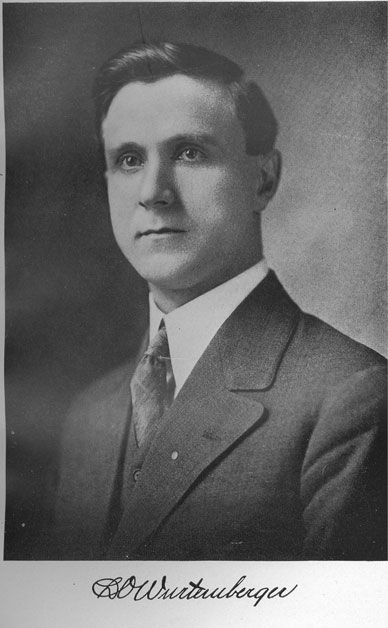
LEWIS OLIVER WURTEMBERGER. who for the past four years has been auditor of Trumbull County, is a resident of Niles, and was one of the active young business leaders of that city prior to his election to county office.
Mr. Wurtemberger was born at Bucyrus, Ohio, July 4, 1884, son of George J. and Sarah (Woodling) Wurtemberger. His father was born in the City of Philadelphia in 1826, a son of John Wurtemberger, a native of Germany. The family were early settlers in Fairfield County, Ohio. During his early life George J. Wurtemberger was a carpenter,
YOUNGSTOWN AND THE MAHONING VALLEY - 19
later a meat merchant at Bucyrus until 1898, in which year he moved his business to Toledo. He remained in that city until the fall of 1918, when he went to Warren and died there in the same year. Sarah Woodling was born in Crawford County, Ohio, her parents being native Pennsylvanians.
L. O. Wurtemberger acquired his early education in the schools of Bucyrus and Toledo. He left school at sixteen to begin an apprenticeship at the watchmaker's trade at Fostoria. His active business career covers about fifteen years. He spent the year 1904 in Colorado, and in 1905 engaged in the jewelry business at Niles. He was soon at the head of a growing establishment, and became very influential and popular in that section of the county. In 19143 he was appointed deputy county auditor, and in 1916 became chief of that office by popular election. He was re-elected in 1918, and will retire to private business at the expiration of his term as county auditor on March 1, 1923, his term having by law been extended one year and five months.
Mr. Wurtemberger is a member of the executive committee of the Mahoning Valley McKinley Club, a non-partisan organization. He was a member of the committee which had charge of the club's annual banquet in 1919, held in the McKinley Memorial at Niles, a banquet attended by nearly 500 members and invited guests. Mr. Wurtemberger in 1918 was elected president of the Giddings Republican Club of Trumbull County for the year 1919. He has a large acquaintance among business men, public leaders and other influential citizens of Ohio.
Mr. Wurtemberger is a member of Mahoning Lodge, No. 394 Free and Accepted Masons, Mahoning Chapter No. 66 Royal Arch Masons, Warren Council, No. 58, Royal and Select Masons, Warren Commandery No. 39 Knights Templar and of Falcon Lodge No. 436 at Niles and Trumbull Encampment at Warren of the Odd Fellow's, and with Niles Lodge Knights of Pythias. He is also a member and director of the Niles Chamber of Commerce and Niles First Methodist Episcopal Church.
Mr. Wurtemberger married Jennie M. Lewis, daughter of William R. and Elizabeth Lewis, formerly of Sharon, Pennsylvania, now of Niles. They have two children: Mary Olive, born December 24, 1908; and Lois Jane, born September 11, 1916.
ADOPH J. BOEHME. During the past twenty years much of the survey, engineering detail and technical planning of various industrial projects in the Mahoning Valley have been handled by Mr. Boehme, who is chief field engineer of the Youngstown Sheet & Tube Company.
Mr. Boehme, whose high rank in engineering circles is widely known throughout Eastern Ohio and Western Pennsylvania was born in Union City, Indiana, October 12, 1877, but has spent the greater part of his life in Youngstown. His parents are Ernest A. and Barbara (Emmelheinz) Boehme. His father was born in Germany and his mother in Columbus, Ohio, of German parentage. Ernest A. Boehme came with his parents to the United States at the age of sixteen and grew up at Pittsburgh. He studied for the ministry and after being ordained at Union City, Indiana, was active in the service in the Joint Synod of Ohio of the Lutheran Church for thirty-two years. Twenty-five years of that time he was pastor of the Wood Street Martin Luther Church in Youngstown. Since 1910 he has lived retired from the ministry.
Adolph J. Boehme, only son in a family of five children, was six years of age when his parents located at Youngstown in 1883. He attended the parochial school of his father's church, also the Wood Street Public School, and graduated from the Rayen High School in 1897. The following fall he entered the Ohio State University, and in 1901 received his degree as a mechanical engineer, having also specialized in civil engineering. Mr. Boehme had much of his early experience in practical engineering under David M. Wise, then chief engineer of the Youngstown Sheet & Tube Company. He assisted Mr. Wise in surveying and laying out construction work for the present grounds of the Sheet and Tube Company, during July, 1901. In December, 1902, Mr. Wise assigned him the task of making the preliminary surveys for the projected line of the West Side Belt Line Railroad of Pittsburgh from the Pennsylvania State Line to Mentor Marsh in Lake County, Ohio. This industrial road was afterwards absorbed by other corporations. In September, 1903, Mr. Boehme was directly employed by John H. Fitch and others to do the engineering work for the Belmont Park Cemetery. Following this he returned to Mr. Wise and was employed in making the preliminary survey of Lake Hamilton, owned by the Mahoning Valley Water Company. Before the dam and reservoir had been completed, however, in August, 1906, Mr. Boehme was employed on construction work at the Bessemer steel plant of the Youngstown Sheet and Tube Company, and on August 10, 1906, he left the employment of Mr. Wise and became identified with the construction of the No. 2 blast furnace for the Shenango Furnace Company at Sharpsville, Pennsylvania.
Mr. Boehme has held the post of chief field engineer of the Youngstown Sheet & Tube Company from April 1, 1907. He was one of the organizers of the Engineers Club of the Youngstown District, has been honored with the office of president, and is one of the present directors. He is also a member of the Chamber of Commerce and was appointed on the committee of the Ohio-Pennsylvania Canal Board of the Chamber of Commerce. May 28, 1907, Mr. Boehme married Miss Marie G. Schuh, of Allegheny, Pennsylvania. They have two children, Ernestine H. and Carl A. Mr. Boehme and family are members of the Woodlawn Avenue Lutheran Church.
JACOB M. FARIS, superintendent of the mechanical and. electrical department of the Youngstown Sheet and Tube Company, is one of the oldest technical men in the service of that great corporation, and as an engineer has gained a high place in his profession by practical experience and achievement and without the aid of a technical education.
Mr. Faris was born at Pomeroy, Ohio, November 29, 1871, son of Mathew and Mary Jane (Parsons) Faris. His widowed mother is still living. His father spent the greater part of his active life as laborer in a salt mill at Pomeroy. Both parents were born in Ohio.
20 - YOUNGSTOWN AND THE MAHONING VALLEY
Jacob M. Faris, one of three children, grew up at Pomeroy and had only a public school education. As a youth he began an apprenticeship at the machinist's trade, and for a time was employed as an engineer in the Pomeroy Rolling Mill, subsequently became a millwright in that plant, and still later worked in machine shops.
On moving to Youngstown in 1896, Mr. Faris was employed as a mrllwright by the Mahoning Valley Iron Company, and later was promoted to master mechanic. He remained with that corporation about five years, and since then his service with the Youngstown Sheet and Tube Company has been continuous. Beginning as master mechanic, he was afterwards promoted to his present responsibilities as superintendent of the mechanical and electrical department. In one of the greatest industrial plants in Ohio Mr. Faris had the heavy responsibilities of superintending the erection of all the machinery in the plant.
He is an honored member of the Iron and Steel Institute, the Society of Engineers of Western Pennsylvania, and the American Railway Association. He also takes an active interest in civic and social matters, is a member of the Knights of Pythias, the Independent Order of Odd Fellows, the Elks, the Masons, the Rotary Club and the Richard Brown Memorial Methodist Episcopal Church. In July, 1896, Mr. Faris married Miss Carrie E. Genheimer 'of Pomeroy, Ohio. They have one son, Randolph U.
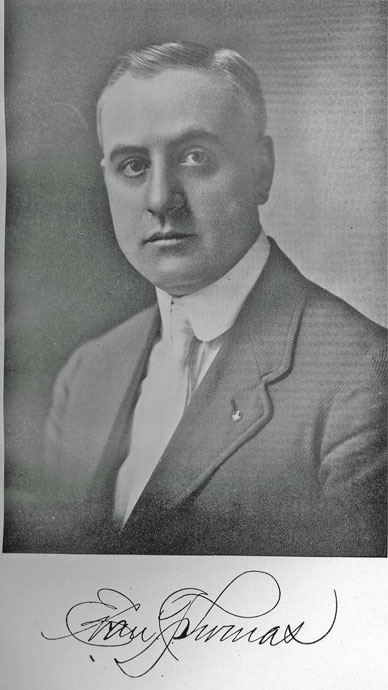
EVAN J. THOMAS, county treasurer of Trumbull County, is in the second generation of his particular branch of the Thomas family in the Mahoning Valley. He was born April 28, 1881, on a farm in Brookfield Township, Trumbull County, and all of his life has been in this county. He is a son of John R. and Margaret J. (Evans) Thomas.
John R. Thomas was born in 1836 in Wales, and twenty years later he came to the United States. He came alone, and located in the Welsh settlement in Brookfield Township, Trumbull County. While in early life Mr. Thomas was a coal miner, in .later years he engaged in the meat business, combined with general farming. He is now retired from active business and lives in Niles. His wife who died in 1912, was of Welsh descent and was born in 1837, near Belmont Avenue in what is now North Youngstown.
While a boy on the farm Evan J. Thomas attended the district schools, but when he was twelve years old he went to Niles where he entered high school. When he was fourteen years of age he entered the employ of the First National Bank of Niles, and continued there for four years. He was next the paymaster of the old Falcon Iron and Nail Company at Niles or until that mill was absorbed by the American Sheet and Tin Plate Company. He then entered a business college in Warren where he graduated in 1900, and in that year he entered the employ of the Western Reserve National Bank of Warren, where he continued for twelve and a half years as assistant cashier in 1913 resigning to become secretary-treasurer of the firm of Morgan & Williams of Warren.
In 1915, Mr. Thomas organized the Weir-Thomas Realty Company of Warren, of which he was secretary and treasurer. In 1916 he was elected treasurer of Trumbull County, and two years later he was re-elected to the same office, his second term expiring September 1, 1921. When entering upon his duties as county treasurer he disposed of all other business interests.
Mr. Thomas is a member and Past Master of Old Erie Lodge No. 3, Free and Accepted Masons, and. of Warren Commandery No. 39 Knights Templar, Cleveland Consistory (Thirty-second degree) and of Al Koran Temple Nobles of the Mystic Shrine, Cleveland.
On October 19, 1910, Mr. Thomas married Laura Belle Reese, of Youngstown. She is a daughter of William A. and Hannah (Jones) Reese. Their children are: Evan J. Thomas, Jr., and Robert J. Thomas.
FRANK H. NULLMEYER. Few of the department heads of the Youngstown Sheet and Tube Company have had more varied experience, and none have been in greater degree the architects of their own fortunes, than Frank H. Nullmeyer. Starting his independent career when still a lad, with no favoring advantages and but a limited education, he worked his way through industry to preferred employments, in the meantime preparing himself by special courses of study for better things, and today is superintend ent of the rod, wire and conduit works at the Struthers plant.
Mr. Nullmeyer is of Pennsylvania nativity, having been born at Homestead, where now stand the Carnegie Works, September 5, 1874. He is a son of Henry C. and Louisa K. (Fickeisen) Nullmeyer, the former of whom was born in Germany but was but six months old when brought to the United States by his father, Christopher, who was engaged in the coal and real estate business at Pittsburgh until his death. Henry C. Nullmeyer grew up at Pittsburgh and was there married. As a youth he learned the carpenter's trade and followed that occupation for some years, subsequently embarking in mercantile pursuits. Died August 4, 1920.
Frank H. Nullmeyer grew up at Pittsburgh and as a boy attended the public schools. At the age of fifteen years he started to work as helper to a plumber, for the modest wage of so cents per week, but a little later forsook this position to enter the cold rolling department of the Jones-Laughlin Company, under Mr. Brobech, at $5 a week. Later he was put on the rolls, "catching," and about this time, seeing the need of a better education, took up mechanical drawing in night classes at the local Young Men's Christian Association. His next employment was as an apprentice of Thomas Carlin's Sons, founders and machinists, and, after three years as an apprentice, worked one year as a journeyman. While still an apprentice, he took a correspondence course 'in the International Correspondence Schools, of Scranton, Pennsylvania, specializing in mechanical engineering and chemistry and completing the former. For three years following this, he worked as an apprentice at mechanical engineer,. ing for Henry Aiken, and upon completing this worked as a 'mechanical engineer for Samuel Discher
YOUNGSTOWN AND THE MAHONING VALLEY - 21
for, one year. In 1899 Mr. Nullmeyer accepted a position as draftsman for the Shoenberger Steel Company, of Pittsburgh, and this proved to be his, real start in the mill business. From an ordinary draftsman he became chief draftsman, and during the period of his rise this concern was absorbed by the Steel Corporation, in 1900, and Mr. Nullmeyer remained with the new company. Later he was made assistant chief engineer of the Pittsburgh District, and March 1, 1903, was appointed assistant superintendent of the Rankin Mill of the American Steel and Wire Company. On January 1, 1905, Mr. Nullmeyer was made assistant superintendent of the Donora Mill, of which W. H. Farrell was superintendent; January 15, 1906, was made superintendent of the Braddock Mill; and May 1, 1907, was appointed superintendent of the Rankin Mill and operated both this and the Braddock Mill for a time. On March 22, 1909, he came to Youngstown as superintendent of the rod and wire department of the Youngstown Sheet and Tube Company at Struthers, and later, in August, 1913, the conduit department was added and he has continued as superintendent of these ever since. He has an enviable reputation for industrious and faithful service, and has won the confidence and respect of those with whom he has been associated.
Mr. Nullmeyer is president of the Struthers Chamber of Commerce and is a thirty-second A. A. S. R. Mason and a Noble of the Mystic Shrine. He was married August 12, 1897, to Miss Mary C. Copeman, of what was then Allegheny, now Pittsburgh, Pennsylvania, and to this union there have been born four children : Hilda Louisa, who is the wife of William H. Ludt, Jr.; Walter William, Francis William, and Gladys, who died in infancy. Mr. and Mrs. Nullmeyer are members of the First Presbyterian Church of Struthers.
JEFFERSON N. MARSHALL. has been a carpenter and building contractor in the Mahoning. Valley for over twenty years, is a resident of Niles, but his chief business is the firm of McCaughtry & Marshall, owners of the Pennahio Lumber Company at Girard. This is an extensive business handling building supplies and also doing general contracting work.
Mr. Marshall who deserves a great share of credit for the steadily increasing prosperity of the company, of which he is secretary, was born in Crawford County, Pennsylvania, October 18, 1869, a son of Lewis and Nancy (Arbuckle) Marshall. His parents are still living, their home being one of the farms notable for productivity and improvement in Crawford County. His father inherited fifty acres of the land from his parents, but by his own enterprise has built up a large and profitable property. He was born in 1847 and his wife in 1853. Lewis Marshall is an active prohibitionist and a deacon in the Christian Church. The children comprise seven sons and one daughter, all living except one who lost his life in a railroad accident. Five of the sons have become successful physicians.
Jefferson N. Marshall, the oldest son, attended country schools, in Crawford County, also the New Lebanon High School, and had one year of experience as a teacher. He learned the carpenter's trade in Crawford County; but on coming to Ohio in 1898 spent some time on a farm in Hartford Township of Trumbull County. From the farm he moved to Niles to take charge of .his contracting business, and since then has built many houses and other structures up and down the Mahoning Valley. Mr, Marshall has a keen mind for. analyzing all the problems and factors that enter into construction work and his success has been due to his ability to estimate his contracts with due reference to all the details involved. In 1908 associated with Rev. D. D. Burt and A. T. Hunt he organized the lumber and contracting business at Girard and in 1910 reorganized the firm in partnership with Mr. C. A. McCaughtry, as McCaughtry & Marshall. He is the practical and technical man in the business.
January 30, 1895, Mr. Marshall married Almeda E. Stallsmith, daughter of I. W. Stallsmith of Mercer County, Pennsylvania. They have five children : Zena, wife of Charles Williams of Niles ; Glenn and Mabel, twins, the former at home and the latter the wife of Everett Frye of Avon Park; Alma and Louis, both at home. All the family except the youngest child are active members of the Christian Church. Mr. Marshall is a Royal Arch Mason and Knight of Pythias, and politically he casts his vote for the candidate he believes most deserving of office.
FRANCIS T. MORAN. While Mr. Moran is one of the younger officials of the Brier Hill Steel Company, his experience, training and studies make him one of the leading authorities on the coke and byproducts departments of the iron and steel industry in the Mahoning Valley.
Mr. Moran who is superintendent of the Coke Works of the Brier Hill Company was born at Hamilton, New York, June 25, 1887, one of the five children of Edward T. and Mary (MacDonnell) Moran. His parents were both born in this country of Irish ancestry. Edward T. Moran has spent his active life as a farmer and he and his wife are still living at Hamilton.
Francis T. Moran received his primary education at Hamilton, and after due preparation at Colgate Academy entered Colgate University in 1905. He received his A. B. degree in 1909. With a broad and classical training he first applied himself to teaching, an occupation he followed only four months. Since then all his active energies have been associated with some phase of the coke industry. He was first coke inspector for the United States Steel Corporation in Gary, West Virginia. In order to learn the by-product general operations he next went to Joliet, Illinois, and was in the coke department of the Illinois Steel Company. For a year and a half he was with the Tennessee Coal, Iron and Railroad Company at Birmingham, Alabama, for six months was with the H. Koppers Company, and for a year and a half with the Woodward Iron Company. He spent another year with the Lehigh Coke Company at Bethlehem, Pennsylvania, and from there came to Youngstown to fill his present position as superintendent of the Coke Works of the Brier Hill Steel Company.
His technical experience and qualifications has
22 - YOUNGSTOWN AND THE MAHONING VALLEY
earned him membership in the American Gas Association, the American Iron and Steel Institute, the Engineers Club of the Youngstown District. Fraternally he is an Elk and a Catholic in religion. On general political issues he votes as a republican. February 26, 1919, Mr. Moran married Miss Colletta Kothiemer of Youngstown.
